A variety with solvable, but not uniformly solvable, word problem
财务管理专业英语unit6
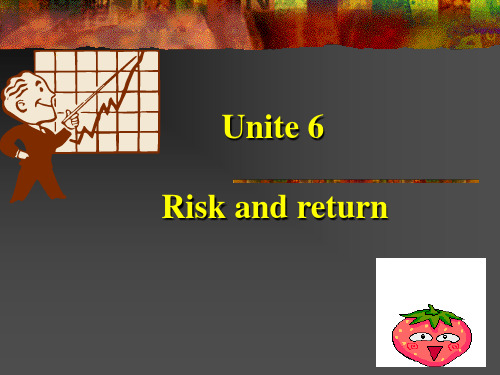
Words study
12.Allocationally efficient markets 配置有效市场
operationally efficient markets 运营有效市场
informationally efficient markets 信息有效市场
When prices are determined in a way that equates the marginal rates of return (adjusted for risk) for all producers and savers, the market is said to be allocationally efficient.
Words study
14.Anomaly 异常 15.Underpricing 价格低估 16.Monday effect 星期一效应 January effect 元月效应
On average, stocks have lower (negative) returns on Monday, compared to (positive) returns on other days of the week.
place, nor is my whole estate upon the fortune of this present years; Therefore, my merchandise makes me not sad.
——Shakespear, Merchant of Venice
我的买卖的成败并不完全寄托在一艘船上,更不是倚赖着一处地方;我 的全部财产,也不会因为这一年的盈亏而受到影响,所以我的货物并不 能使我忧愁。
Words study
你有什么天赋的英语作文
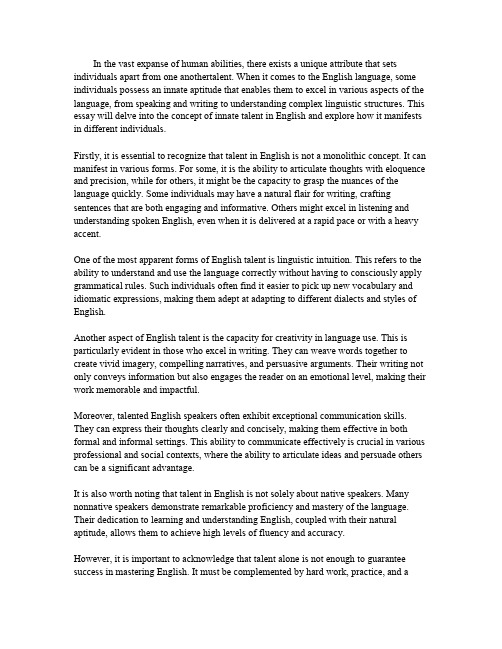
In the vast expanse of human abilities, there exists a unique attribute that sets individuals apart from one anothertalent. When it comes to the English language, some individuals possess an innate aptitude that enables them to excel in various aspects of the language, from speaking and writing to understanding complex linguistic structures. This essay will delve into the concept of innate talent in English and explore how it manifests in different individuals.Firstly, it is essential to recognize that talent in English is not a monolithic concept. It can manifest in various forms. For some, it is the ability to articulate thoughts with eloquence and precision, while for others, it might be the capacity to grasp the nuances of the language quickly. Some individuals may have a natural flair for writing, crafting sentences that are both engaging and informative. Others might excel in listening and understanding spoken English, even when it is delivered at a rapid pace or with a heavy accent.One of the most apparent forms of English talent is linguistic intuition. This refers to the ability to understand and use the language correctly without having to consciously apply grammatical rules. Such individuals often find it easier to pick up new vocabulary and idiomatic expressions, making them adept at adapting to different dialects and styles of English.Another aspect of English talent is the capacity for creativity in language use. This is particularly evident in those who excel in writing. They can weave words together to create vivid imagery, compelling narratives, and persuasive arguments. Their writing not only conveys information but also engages the reader on an emotional level, making their work memorable and impactful.Moreover, talented English speakers often exhibit exceptional communication skills. They can express their thoughts clearly and concisely, making them effective in both formal and informal settings. This ability to communicate effectively is crucial in various professional and social contexts, where the ability to articulate ideas and persuade others can be a significant advantage.It is also worth noting that talent in English is not solely about native speakers. Many nonnative speakers demonstrate remarkable proficiency and mastery of the language. Their dedication to learning and understanding English, coupled with their natural aptitude, allows them to achieve high levels of fluency and accuracy.However, it is important to acknowledge that talent alone is not enough to guarantee success in mastering English. It must be complemented by hard work, practice, and acontinuous desire to improve. Talent can provide a head start, but it is the commitment to learning and refining ones skills that ultimately leads to mastery.In conclusion, the talent for English is a multifaceted gift that can manifest in various ways, from linguistic intuition to creative writing and effective communication. While it can provide an advantage, it is the combination of talent and dedication that truly sets apart those who excel in the English language. Recognizing and nurturing this talent, whether in oneself or in others, can lead to a deeper appreciation and mastery of the rich and diverse world of English.。
ARTHUR_1999_Complexity_and_the_economy
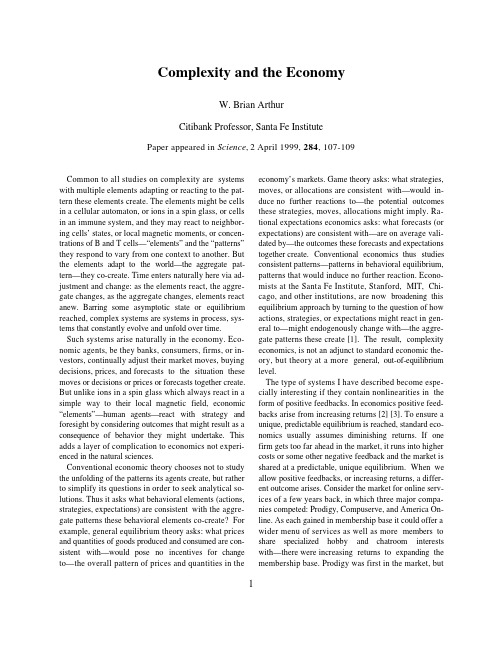
Complexity and the EconomyW. Brian ArthurCitibank Professor, Santa Fe InstitutePaper appeared in Science,2 April 1999, 284, 107-109Common to all studies on complexity are systems with multiple elements adapting or reacting to the pat-tern these elements create. The elements might be cells in a cellular automaton, or ions in a spin glass, or cells in an immune system, and they may react to neighbor-ing cells’ states, or local magnetic moments, or concen-trations of B and T cells—“elements” and the “patterns”they respond to vary from one context to another. But the elements adapt to the world—the aggregate pat-tern—they co-create. Time enters naturally here via ad-justment and change: as the elements react, the aggre-gate changes, as the aggregate changes, elements react anew. Barring some asymptotic state or equilibrium reached, complex systems are systems in process, sys-tems that constantly evolve and unfold over time.Such systems arise naturally in the economy. Eco-nomic agents, be they banks, consumers, firms, or in-vestors, continually adjust their market moves, buying decisions, prices, and forecasts to the situation these moves or decisions or prices or forecasts together create. But unlike ions in a spin glass which always react in a simple way to their local magnetic field, economic “elements”—human agents—react with strategy and foresight by considering outcomes that might result as a consequence of behavior they might undertake. This adds a layer of complication to economics not experi-enced in the natural sciences.Conventional economic theory chooses not to study the unfolding of the patterns its agents create, but rather to simplify its questions in order to seek analytical so-lutions. Thus it asks what behavioral elements (actions, strategies, expectations) are consistent with the aggre-gate patterns these behavioral elements co-create? For example, general equilibrium theory asks: what prices and quantities of goods produced and consumed are con-sistent with—would pose no incentives for change to—the overall pattern of prices and quantities in theeconomy’s markets. Game theory asks: what strategies, moves, or allocations are consistent with—would in-duce no further reactions to—the potential outcomes these strategies, moves, allocations might imply. Ra-tional expectations economics asks: what forecasts (or expectations) are consistent with—are on average vali-dated by—the outcomes these forecasts and expectations together create. Conventional economics thus studies consistent patterns—patterns in behavioral equilibrium, patterns that would induce no further reaction. Econo-mists at the Santa Fe Institute, Stanford, MIT, Chi-cago, and other institutions, are now broadening this equilibrium approach by turning to the question of how actions, strategies, or expectations might react in gen-eral to—might endogenously change with—the aggre-gate patterns these create [1]. The result, complexity economics, is not an adjunct to standard economic the-ory, but theory at a more general, out-of-equilibrium level.The type of systems I have described become espe-cially interesting if they contain nonlinearities in the form of positive feedbacks. In economics positive feed-backs arise from increasing returns [2] [3]. To ensure a unique, predictable equilibrium is reached, standard eco-nomics usually assumes diminishing returns. If one firm gets too far ahead in the market, it runs into higher costs or some other negative feedback and the market is shared at a predictable, unique equilibrium. When we allow positive feedbacks, or increasing returns, a differ-ent outcome arises. Consider the market for online serv-ices of a few years back, in which three major compa-nies competed: Prodigy, Compuserve, and America On-line. As each gained in membership base it could offer a wider menu of services as well as more members to share specialized hobby and chatroom interests with—there were increasing returns to expanding the membership base. Prodigy was first in the market, but1by chance and strategy American Online got far enough ahead to gain an unassailable advantage. Today it domi-nates. Under different circumstances, another rival might have taken the market. Notice the properties here: a multiplicity of potential “solutions”; the outcome actu-ally reached is not predictable in advance; it tends to be locked in; it is not necessarily the most efficient eco-nomically; it is subject to the historical path taken; while the companies may start equal, the outcome is asymmetrical. These properties have counterparts in non-linear physics where similar positive feedbacks are present. What economists call multiple equilibria, non-predictability, lock-in, inefficiency, historical path de-pendence, and asymmetry; physicists call multiple meta-stable states, unpredictability, phase- or mode-locking, high-energy ground states, non-ergodicity, and symmetry breaking [3].Increasing returns problems have been discussed in economics for a long time. A hundred years ago, Alfred Marshall [5] noted that if firms gain advantage as their market share increases, “whatever firm first gets a good start will obtain a monopoly.” But the conventional, static equilibrium approach gets stymied by indetermi-nacy: If there is a multiplicity of equilibria, how might one be reached? The process-oriented, complexity ap-proach suggests a way to deal with this. In the actual economy, “small random events” happen—in the on-line-services case “random” interface improvements, new offerings, word-of-mouth recommendations. Over time increasing returns magnifies the cumulation of such events to “select” the outcome randomly. Thus increasing returns problems in economics are best seen as dynamic processes with random events and natural positive feedbacks—as nonlinear stochastic processes. This shift from a static outlook into a process orienta-tion is common to complexity studies. Increasing re-turns problems are being studied intensively in market allocation theory [3], international trade theory [6], the evolution of technology choice [7], economic geogra-phy [8], and the evolution of patterns of poverty and segregation [9]. The common finding that economic structures can crystallize around small events and lock in is beginning to change policy in all these areas to-ward an awareness that governments should avoid both extremes of coercing a desired outcome or keeping strict hands off, and instead seek to push the system gently toward favored structures that can grow and emerge natu-rally. Not a heavy hand, not an invisible hand, but a nudging hand.Once we adopt the complexity outlook, with its em-phasis on the formation of structures rather than their given existence, problems involving prediction in the economy look different. The conventional approach asks what forecasting model (or expectations) in a particular problem, if given and shared by all agents, would be consistent with—would be on average validated by—the actual time series this forecasting model would in part generate. This “rational expectations” approach is valid.But it assumes that agents can somehow deduce in ad-vance what model will work, and that everyone “knows”that everyone knows to use this model (the common knowledge assumption.) What happens when forecast-ing models are not obvious and must be formed indi-vidually by agents who are not privy to the expectations of others?Consider as an example my El Farol Bar Problem[10]. One hundred people must decide independentlyeach week whether to show up at their favorite bar (El Farol in Santa Fe). The rule is that if a person predicts that more that 60 (say) will attend, he will avoid the crowds and stay home; if he predicts fewer than 60 he will go. Of interest are how the bar-goers each week might predict the numbers showing up, and the result-ing dynamics of the numbers attending. Notice two features of this problem. Our agents will quickly realize that predictions of how many will attend depend on oth-ers’ predictions of how many attend (because that deter-mines their attendance). But others’ predictions in turn depend on their predictions of others’ predictions. De-ductively there is an infinite regress. No “correct” expec-tational model can be assumed to be common knowl-edge, and from the agents’ viewpoint, the problem is ill-defined. (This is true for most expectational prob-lems, not just for this example.) Second, and diaboli-cally, any commonalty of expectations gets broken up: If all use an expectational model that predicts few will go, all will go, invalidating that model. Similarly, if all believe most will go, nobody will go, invalidating that belief. Expectations will be forced to differ.In 1993 I modeled this situation by assuming that as the agents visit the bar, they act inductively—they act as statisticians, each starting with a variety of subjec-tively chosen expectational models or forecasting hy-potheses. Each week they act on their currently most23accurate model (call this their active predictor). Thus agents’ beliefs or hypotheses compete for use in an ecology these beliefs create. Computer simulation (Fig.1) showed that the mean attendance quickly converges to 60. In fact, the predictors self-organize into an equilib-rium “ecology” in which of the active predictors 40%on average are forecasting above 60, 60% below 60.This emergent ecology is organic in nature. For, while the population of active predictors splits into this 60/40average ratio, it keeps changing in membership forever.Why do the predictors self-organize so that 60 emerges as average attendance and forecasts split into a 60/40ratio? Well, suppose 70% of predictors forecasted above 60 for a longish time, then on average only 30 people would show up. But this would validate predictors that forecasted close to 30, restoring the “ecological” balance among predictions. The 40%–60% “natural” combina-tion becomes an emergent structure. The Bar Problem is a miniature expectational economy, with complex dy-namics. [11].0102030405060708090100020406080100TimeFigure 1. Bar Attendance in the first 100 Weeks.One important application of these ideas is in finan-cial markets. Standard theories of financial markets assume rational expectations—that agents’ adopt uni-form forecasting models that are on average validated by the prices these forecast [12]. The theory works well to first order. But it doesn’t account for actual market “anomalies” such as unexpected price bubbles and crashes, random periods of high and low volatility (price variation), and the heavy use of technical trading (trades based on the recent history of price patterns).Holland, LeBaron, Palmer, and I [13] have created a model which relaxes rational expectations by assum-ing, as in the Bar Problem, that investors cannot as-sume or deduce expectations but must discover them.Our agents continually create and use multiple "market hypotheses"—individual, subjective, expectational models—of future prices and dividends within an artifi-cial stock market on the computer. These “investors”are individual, artificially-intelligent computer pro-grams that can generate and discard expectational “hy-potheses,” and make bids or offers based on their cur-rently most accurate hypothesis. The stock price forms from their bids and offers, and thus ultimately from agents’ expectations. So this market-in-the-machine is its own self-contained, artificial financial world. Like the bar, it is a “mini-ecology” in which expectationscompete in a world these expectations create.Within this computerized market, we found two phases or regimes. If parameters are set so that our artificial agents update their hypotheses slowly, the diversity of expectations collapses quickly into homo-geneous rational expectations ones. The reason is that if a majority of investors believes something close to the rational expectations forecast, then resulting prices will validate it, and deviant or mutant predictions that arise in the population of expectational models will be rendered inaccurate. Standard finance theory, under these special circumstances, is upheld. But if the rate of up-dating of hypotheses is turned up, the market under-goes a phase transition into a “complex regime” and displays several of the “anomalies” observed in real markets. It develops a rich “psychology” of divergent beliefs that don’t converge over time. Expectational rules such as “If the market is trending up, predict a 1% price rise” that appear randomly in the population of hypotheses can become mutually reinforcing—if enough investors act on these, the price will indeed go up. Thus sub-populations of mutually reinforcing ex-pectations arise, agents bet on these (therefore technical trading emerges) and this causes occasional bubbles and crashes. Our artificial market also shows periods of high volatility in prices followed randomly by periods of low volatility. This is because if some investors “discover” new, profitable hypotheses, they change the market slightly, causing other investors to also change their expectations. Changes in beliefs therefore ripple through the market in avalanches of all sizes, causing periods of high and low volatility. We conjecture that actual financial markets, which show exactly these phenomena, lie in this “complex” regime. ConclusionAfter two centuries of studying equilibria—static patterns that call for no further behavioral adjust-ments—economists are beginning to study the general emergence of structures and unfolding of patterns in the economy. Complexity economics is not a temporary adjunct to static economic theory, but theory at a more general, out-of-equilibrium level. The approach is mak-ing itself felt in every area of economics: game theory [14], the theory of money and finance [15], learning inthe economy [16], economic history [17], the evolu-tion of trading networks [18], the stability of the econ-omy [19], and political economy [20]. It is helping us understand phenomena such as market instability, the emergence of monopolies, and the persistence of pov-erty in ways that will help us deal with these. And it is bringing an awareness that policies succeed better by influencing the natural processes of formation of eco-nomic structures, than by forcing static outcomes.When viewed in out-of-equilibrium formation, eco-nomic patterns sometimes simplify into the simple, homogeneous equilibria of standard economics. More often they are ever-changing, showing perpetually novel behavior and emergent phenomena. Complexity therefore portrays the economy not as deterministic, predictable and mechanistic; but as process-dependent, organic and always evolving.References and Notes1. See the general collections in P. Anderson, K. J.Arrow, D. Pines, Eds. The Economy as an Evolving Complex System (Addison-Wesley, Reading, Mass., 1988) and W. B. Arthur, S. N. Durlauf, D. A. Lane, Eds. The Economy as an Evolving Complex System II (Addison-Wesley, Reading, Mass., 1997).2. W. B. Arthur, Scientific American, 92, (1990).3. W. B. Arthur, Increasing Returns and Path Depend-ence in the Economy (University of Michigan Press, Ann Arbor, 1994).4. Note that I have avoided exact definitions of “com-plexity” and “complex systems.” Technically, the sys-tems I have described are referred to as adaptive nonlin-ear networks (J. H. Holland’s term), and typically if they exhibit certain properties that have to do with the multiplicity of potential patterns or with the coherence or propagation of sub-structures they are said to be “complex.”Definitions vary widely.5. A. Marshall, Principles of Economics, 459, (8thEdition, Macmillan, London, 1920).6. E. Helpman and P. R. Krugman, Market Structureand Foreign Trade, (MIT Press, Cambridge, Mass., 1985).47. W. B. Arthur, Econ. Journal, 99, 116, (1989).8. W. B. Arthur in Math. Social Sciences, 19, 235, (1990); P. R. Krugman in J. Pol. Econ. 99, 483, (1991) and in The Economy as an Evolving Complex System II, (Op. Cit.); P. R. Krugman, Geography and Trade (MIT Press, Cambridge, Mass, 1991).9. S. N. Durlauf, in The Economy as an Evolving Complex System II, (Op. Cit.) and in J. Econ. Growth 1, 75, (1996).10. W. B. Arthur, Amer. Econ. Review, 84, 406, (1994).11. J. Casti, Complexity, 1, no. 5, 7, (1995/96); M.A. R. de Cara, O. Pla, F. Guinea, to appear, EPJ, (1999); D. Challet and Y.-C. Zhang, Physica A, 246, 407, (1997) and 256, 514, (1998).12. R. E. Lucas, Econometrica 46, 1429 (1978).13. W. B. Arthur, J. H. Holland, B. LeBaron, R. Palmer, and Paul Tayler, in The Economy as an Evolving Complex System II, 15, (Op. Cit.); W. B. Arthur, Complexity, 1 (1), 20, (1995).14. See K. Lindgren’s classic paper in Artificial Life II, C. G. Langton, C. Taylor, J. D. Farmer, S. Ras-mussen, Eds. (Addison-Wesley, Reading, Mass., 1991). H. P. Young in Econometrica 61, 57, 1993; L.E. Blume, in The Economy as an Evolving Complex System II, 425, (Op. Cit.); B. A. Huberman, N. S. Glance, Proc. Nat. Acad. Sci. 90, 7716, (1993).15. R. Marimon, E. McGrattan, T. J. Sargent, J.Econ. Dynamics and Control, 14, 329, (1990); M.Shubik, in The Economy as an Evolving Complex System II, 263, (Op. Cit.); W. A. Brock, P. de Lima, in Handbook of Statistics 12: Finance, G. S. Maddala,H. Rao, H. Vinod, Eds. (North Holland, Amsterdam,1995)16. T. J. Sargent, Bounded Rationality in Macroeco-nomics, (Clarendon Press, Oxford, 1993); D. A. Lane and R. Maxfield, in The Economy as an Evolving Complex System II, 169, (Op. Cit.); V. M. Darley and S. A. Kauffman, in The Economy as an Evolving Complex System II, 45, (Op. Cit.).17. D. C. North, in The Economy as an EvolvingComplex System II, 223, (Op. Cit.).18. Y. M. Ioannides in The Economy as an EvolvingComplex System II, 129, (Op. Cit.); A. P. Kirman in The Economy as an Evolving Complex System II, 491, (Op. Cit.); L. Tesfatsion in The Economy as an Evolving Complex System II, 533, (Op. Cit.).19. P. Bak, K. Chen, J. Scheinkman, M. Woodford inRicerche Economiche 47, 3, (1993); A. Leijonhufvud, in The Economy as an Evolving Complex System II, 321, (Op. Cit.).20. R. Axelrod, Am. Pol. Sci. Rev. 80, 1095, (1986);K. Kollman, J. H. Miller, S. E. Page, in The Econ-omy as an Evolving Complex System II, 461.5。
2010年大学英语四级考试模拟试题第2期及答案

2010年大学英语四级考试模拟试题第2期Part I Writing(30 minutes)Directions: For this part, you are allowed 30 minutes to write a composition on the topic “Psychological Problems for College Students”. You should write at least 120 words following the outl ine given below in Chinese:1. 有些大学生存在心理问题;2. 出现这种现象的原因;3. 应对措施。
Part II Reading Comprehension (Skimming and Scanning)(15 minutes)Directions: In this part, you will have 15 minutes to go over the passage quickly. For questions 1-7, choose the best answer from the four choices marked A), B), C) and D). For questions 8-10, complete the sentences with the information given in the passage.DepressionDepression is a common type of mental disorder — most people will be affected by depression in their lives either directly or indirectly. Confusion about depression is commonplace: for example, about what depression is and what makes it different from just feeling down. There is also confusion surrounding the many types of depression that people may experience. There have been so many terms used to describe this set of feelings we’ve all felt at one time or another in our lives, to one degree or another, that it is time to set the record straight.1. Types of DepressionDepressive disorders come in different forms, just as other illnesses such as heart disease. This passage briefly describes three of the most common types of depressive disorders. However, within these types there are variations in the number of symptoms, their severity, and persistence.Major depression is manifested by a combination of symptoms that interfere with the ability to work, study, sleep, eat, and enjoy once pleasurable activities. Such a disabling episode of depression may occur only once but more commonly occurs several times in a lifetime.A less severe type of depression, dysthymia, involves long-term, chronic symptoms that do not disable, but keep one from functioning well or from feeling good. Many people with dysthymia also experience major depressive episodes at some time in their lives.Another type of depression is bipolar disorder, which is characterized by cycling mood changes: severe highs (mania) and lows (depression). Sometimes the mood switches are dramatic and rapid, but most often they are gradual. When in the depressed cycle, an individual can have any or all of the symptoms of a depressive disorder. When in the manic cycle, the individual may be overactive, over-talkative, and have agreat deal of energy. Mania often affects thinking, judgment, and social behavior in ways that cause seriousproblems and embarrassment. For example, the individual in a manic phase may feel elated and full of grandschemes that might range from unwise business decisions to romantic sprees.2. Symptoms of DepressionDepression is characterized by a number of common symptoms. Not everyone who is depressed or manic experiences every symptom. Some people experience a few symptoms, some many. Severity of symptoms varies with individuals and also varies over time.●Persistent sad, anxious, or “empty”mood●Feelings of hopelessness, pessimism●Feelings of guilt, worthlessness, helplessness●Loss of interest or pleasure in hobbies and activities that were once enjoyed●Decreased energy, fatigue, being “slowed down”●Difficulty concentrating, remembering, or making decisions●Insomnia, early-morning awakening, or oversleeping●Appetite and/or weight loss or overeating and weight gain●Thoughts of death or suicide; suicide attempts●Restlessness, irritability●Persistent physical symptoms that do not respond to treatment, such as headaches, digestive disorders and chronic pain3. Risk Factors of DepressionWhile depression can strike anyone at any time, research has identified several factors associated with an increased risk for depression:Family History — Having an immediate family member with depression increases the risk of developing depression. Other mental illnesses, such as alcoholism in family members, can also increase the risk for depression.Early Childhood Experience — Early childhood trauma, such as loss of a parent before adolescence, child neglect, physical, emotional abuse, and parental divorce are all linked to increased risk for adult depression.Stress — Negative life events, such as divorce, loss of a loved one or loss of employment are associated with increased depression. Research shows that chronic stresses (such as illness, lack of social support and numerous “daily hassles”) are also linked to depression.Alcohol — Depression and alcoholism is often seen in the same patients at the same time. Alcohol is a depressant drug and its presence in a depressed person has serious implications for treatment outcome.Residence — Depression seems to be higher in urban residents than in rural residents. In fact, one study found that depression was twice as common among city dwellers as among those who lived in rural areas.Marital Status — Depression is highest among divorced, separated, or co-habitating people. It is lowest among single and married people. People living alone have higher rates of depression than those living with others do.Work Status — Research shows that people unemployed for six months or more in the last five years had a rate of depression three times that of the general population.Physical Illness — Certain physical illnesses are associated with depression, such as thyroid disorder, hormonal imbalances, chronic viral infections, cancer and heart diseases.Gender — It is estimated that one out of every four women and one out of every ten men experience some type of depression during their lifetime. While women suffer from depression more often and attempt suicide more frequently, men are more successful in their suicide attempts. Women also suffer from unique forms of depression related to their unique biology and life experiences.Age — Most people experience their first episode of depression between the ages of 20 and 40. In fact, the average age of onset of depression is the mid-20s. Alarmingly, recent research shows that the average age of onset is decreasing with each generation. Children, adolescents and elderly persons often display unique symptoms of depression and have specific stressful events that predispose them to depression.Ethnic and cultural groups — The World Health Organization named depression the fourth most devastating illness in the world today and predicted that it would become the second ranked illness by 2020. No ethnic or cultural group is immune. While depression occurs at about the same rate in different groups, ethnic and cultural differences often impact the ways in which their members express their feelings and their willingness to seek treatment.Tobacco — Increased tobacco use has been noted in depressed persons and individuals with underlying or current depressive symptoms are likely to experience mood disturbances when they attempt to quit.4. Treatments for DepressionFortunately, there are many effective treatment options for depression. To be most effective, treatment should be specifically tailored to each individual. That is why a detailed interview by a mental health professional is extremely valuable. Established treatments for depression may include:●antidepressant medications●psychotherapy (also known as “talk therapy”or “counseling”)All of these treatments have been shown to treat depression successfully. The choice of treatment will be determined by several factors, including the type and severity of depression, by previous treatment history, and patient preference. A combination of medications and psychotherapy is used to treat most patients, although mild forms of depression may be treated with psychotherapy alone.Effective treatment is based on an accurate assessment, which identifies the causes of depression in any person. Usually depression is a result of biological, psychological and social factors, and an effective treatment plan is one that identifies all of these and develops strategies to reduce their frequency and intensity.1. How will depression affect the majority of people?A) Directly. B) Indirectly.C) Both directly and indirectly.D) Either directly or indirectly.2. How many common types of depression are discussed in this passage?A) Two. B) Three.C) Four. D) Five.3. Bipolar disorder is characterized by ____________.A) a combination of symptomsB) long-term symptomsC) cycling mood changesD) serious problems and embarrassment4. Persistent physical symptoms that do not respond to treatment might include _____________.A) feeling pessimistic B) failure to concentrateC) sleeplessness D) indigestion5. What kind of people are the least likely to suffer from depression?A) Married people.B) Separated people.C) Co-habitating people. D) Divorced people.6. What percentage of women might suffer from depression during their lifetime?A) 10%. B) 25%. C) 40%. D) 45%.7. The World Health Organization predicts that depression will ____________ by 2020.A) become the fourth most devastating illnessB) rank as one of the top two illnessesC) spread among all peopleD) be cured in some countries8. While depression occurs at about the same rate in different groups, _________ differences often impact the ways in which their members express their feelings and their willingness to seek treatment.9. There are established treatments for depression, including _____________ and psychotherapy.10. An effective treatment plan for depression should identify the symptoms and develop strategies to reduce their ____________.Part III Listening Comprehension(35 minutes)■Section ADirections: In this section, you will hear 8 short conversations and 2 long conversations. At the end of each conversation, one or more questions will be asked about what was said. Both the conversation and the questions will be spoken only once. After each question there will be a pause. During the pause, you must read the four choices marked A), B), C) and D), and decide which is the best answer.11. A) The dress is ugly.B) The dress is cheap.C) The dress isn’t a real bargain.D) The dress doesn’t suit the woman.12. A) At 11:52. B) At 11:10.C) At 11:50. D) At 11:48.13. A) She prefers to live in the countryside.B) She doesn’t like the people in cities.C) She wants to move to the city.D) She plans to go to work by car.14. A) At a drugstore. B) At a bookstore.C) At a booking office. D) At a grocery.15. A) An architect. B) An accountant.C) A doctor. D) A teacher.16. A) John’s notes are not complete.B) John’s handwriting is bad.C) John’s notes are useless.D) John’s notes are full of mistakes.17. A) The man doesn’t like entertainment.B) The man lives close to a train station.C) The woman can’t bear any noise.D) The woman wants to buy an apartment.18. A) He doesn’t like dessert very much.B) He will have some chocolate cake.C) He will go to visit his doctor.D) He wants to stay fit.Questions 19 to 22 are based on the conversation you have just heard.19. A) To talk to Sandra.B) To cancel her appointment.C) To make an appointment.D) To invite Sandra to a party.20. A) Design her hair by herself.B) Have her hair done by Betty.C) Make an appointment with Sandra.D) Go to another hair salon.21. A) Have her hair cut.B) Go to visit Sandra.C) See a gentleman. D) Attend a party.22. A) Happy. B) Worried.C) Angry. D) Disappointed.Questions 23 to 25 are based on the conversation you have just heard.23. A) General Electric. B) General Motors.C) United Motors. D) United Electric.24. A) Her mother taught her.B) She learned it in college.C) She learned it from her work.D) She lived in Japan for three years.25. A) She wants to earn more money.B) She wants to learn foreign languages.C) She wants more opportunities for advancement.D) She wants to do business in Asia.■Section BDirections: In this section, you will hear 3 short passages. At the end of each passage, you will hear some questions. Both the passage and the questions will be spoken only once. After you hear a question, you must choose the best answer from the four choices marked A), B), C) and D).Passage OneQuestions 26 to 28 are based on the passage you have just heard.26. A) It can change the earth of the grassland.B) It can cut down the growth rate of weeds.C) It can offer natural fertilizers to the grass.D) It can keep the grassland in good condition.27. A) When the grass is less than five centimeters high.B) When the grass is about ten centimeters high.C) When the grass is more than fifteen centimeters high.D) When the grass is less than fifteen centimeters high.28. A) They need electric fences and watering places.B) They need paddocks and special grazing areas.C) They need water supplies and strong fences.D) They need stronger fences and guard animals.Passage TwoQuestions 29 to 32 are based on the passage you have just heard.29. A) Her daughter.B) Harold “Matt” Matson.C) Her husband.D) A German doll.30. A) About three hundred dollars.B) More than twenty-seven thousand dollars.C) No more than ten thousand dollars.D) About twenty thousand dollars.31. A) He thinks Barbies are harmful to people’s health.B) He thinks Barbies make girls pay less attention to their studies.C) He thinks Saudi Arabia is a good example.D) He thinks Barbies make girls care about their appearance too much.32. A) Supportive. B) Opposed.C) Indifferent. D) Neutral.Passage ThreeQuestions 33 to 35 are based on the passage you have just heard.33. A) The student gets three points.B) The student gets one point.C) The student gets four points.D) The student fails in the course.34. A) It gives students detailed evaluations instead of letter grades.B) It is a private four-year college established in 1967.C) It has a large number of students but no overseas students now.D) It adopts the evaluations written by the professors only.35. A) She thinks they are a good way to evaluate students.B) She doesn’t think they provide good direction for students.C) She thinks they will be replaced by a new evaluation system.D) She thinks they will be changed by the American university system.■Section CDirections: In this section, you will hear a passage three times. When the passage is read for the first time, you should listen carefully for its general idea. When the passage is read for the second time, you are required to fill in the blanks numbered from 36 to 43 with the exact words you have just heard. For blanks numbered from 44 to 46 you are required to fill in the missing information. For these blanks, you can either use the exact words you have just heard or write down the main points in your own words. Finally, when the passage is read for the third time, you should check what you have written.Many people want to know if there is a state religion in the United States. The answer is no and thereason goes back to the early days of America’s history.In the 17th and 18th centuries, many (36) _______ moved to colonial America in part to (37) _________ religious oppression. Thomas Jefferson and other early American leaders (38) ________ designed a national government that had no (39) ______ religion. They wanted to build a country that included many religions, where citizens were free to follow their own (40) __________.The First Amendment of the Constitution supports religious (41) ________ and places religion outside the reach of the government. This idea is often described as “the (42) ________ of church and state”.How the First Amendment (43) __________ to life in America has often been disputed. There is deep opposition between people (44)_______________________________ ____________________________.The church and state debate is still going on today. For some people, polic ies about stem-cell research, same-sex marriage and abortion rights threaten religious beliefs. (45)___________________________________________.Even though there is no state religion in America, there is a large, beautiful religious center in the nation’s capital called the Cathedral Church of Saint Peter and Saint Paul. But an official says the church calls itself the Washington National Cathedral because (46)_________________________________________________.Part IVReading Comprehension (Reading in Depth)(25 minutes)■Section ADirections: In this section, there is a passage with ten blanks. You are required to select one word for each blank from a list of choices given in a word bank following the passage. Read the passage through carefully before making your choices. Each choice in the bank is identified by a letter. You may not use any of the words in the bank more than once.Questions 47 to 56 are based on the following passage.Data from the Chandrayaan-1 (印度“月球初航1号”) spacecraft suggests water is still being formed on its surface. It is believed that the water is 47 at the poles and possibly formed by the solar wind. The finding was made after researchers examined data from three separate 48 to the moon. The reports show that the water may be moving around, forming and reforming as particles become 49 up in the dust on the surface of the moon.Dr. Mylswamy Annadurai, the mission’s project director at the Indian Space Research Organisation in Bangalore, told The Times, “It’s very 50 . This was one of the main objectives of Chandrayaan-1, to find evidence of water on the moon.” The unmanned craft was 51 with NASA’s Moon Mineralogy Mapper (美国航天局设计的月球矿物绘图仪,简称M3), designed 52 to search for water by picking up the electromagnetic radiation sent out by minerals. The M3 was designed to search for water by 53 the electromagnetic radiation given off by different minerals on and just below the surface of the moon. Unlike previous equipment, it was 54 enough to detect the existence of small amounts of water.Carle Pieters of Brown University in Rhode Island and his colleagues 55 data from Chandrayaan-1 and found spectrographic (光谱的) evidence of water. The water seems thicker closer to the poles, they reported. “When we say ‘water on the moon’, we are not talking about lakes or oceans. Water on the moon means molecules of water and hydroxyl (hydrogen and oxygen) that 56 with molecules of rock and dust specifically in the top millimeters of the moon’s surface,” Pieters said in a statement. Scientists said the breakthrough would change the face of lunar exploration.A) specifically I) concentratedB) detecting J) sensitiveC) occasionally K) reviewedD) decisions L) satisfyingE) missions M) dividedF) interact N) equippedG) disappointing O) mixedH) sensible■Section BDirections: There are 2 passages in this section. Each passage is followed by some questions or unfinished sentences. For each of them there are four choices marked A), B), C) and D). You should decide on the best choice.Passage OneQuestions 57 to 61 are based on the following passage.Feeding 30 million schoolchildren is a difficult task. As a result, many of today’s school cafeteria offerings end up as appealing as a tray of lukewarm airplane food. And if there’s one point of agreement on the state of school lunches, it’s that local school districts and the federal government are over-tasked. The U.S. Department of Agriculture’s National School Lunch Program (NSLP) helps feed millions of American schoolchildren. Critics charge that the program is under-funded and misspends money on meals that are overly processed, too rich in fat and not nutritious. The challenge is how to change this on a national and local level.Help has historically trickled in courtesy of local entrepreneurs and nearby natural-food advocates who supplied some schools with organic and farm-fresh foods. Now, a new campaign supported by national corporations hopes to make more sweeping changes across the country. Whole Foods and a loose coalition of organic-food manufacturers and advocates say that creating a healthier national food policy is the start. Last August, Whole Foods launched a fund-raising campaign to reform the country’s school lunch programs and has so far raised more than $440,000 that will support an online effort to help school districts create healthy and affordable meal options. According to the supermarket chain’s chief operating officer Walter Robb, some of that money will also help raise awareness about the Child Nutrition Act (CAN).CAN determines school food policy and financial resources as well as funds the NSLP. Advocates for healthier lunches say that the Nutrition Act will be reauthorized by the president and Congress. School lunch programs now get $9.3 billion in federal funding, or about $2.68 for each eligible child. Subtract labor and other administrative costs and some child-nutrition advocates estimate that only $1 goes toward food. That’s not enough, said Robb. “It’s a Sisyphean situation. We’re at a tipping point. We need to raise exposure and do something right now.”For Ann Cooper, the former director of nutrition services for California’s Berkley Unified School District, help from either the public or private sector is much needed. Cooper, a chef and author, created , funded b y Whole Foods. The site’s mission is “to help your community transition step by step to a school program that will improve the health and well-being of our children”. It features recipes for schools, information about food safety, and promotes community ac tivism. “I hope we’re building a trend,” Cooper said of her partnership with Whole Foods. “More companies are doing this. Maybe it’s part altruistic, part capitalistic. But if a company can make money feeding kids and make them healthier, that’s the bottomline.”57. From the first paragraph, what can we learn about today’s school cafeteria offerings?A) They are good but not adequate.B) They are not healthy enough.C) They are rich in fat and protein.D) They are the same as those on airplanes.58. The u nderlined word “coalition” in the second paragraph means “_________”.A) a union of two political partiesB) a combination of different partsC) a group of people who join togetherD) a kind of movement59. The money raised by Whole Foods will be primarily used to ____________.A) carry out school food policiesB) make people better aware of CANC) launch a campaign about healthy foodD) help school districts provide better food60. What does the underlined sentence “It’s a Sisyphean situation.” in the th ird paragraph mean?A) A situation that is satisfactory and should be maintained.B) A situation that hasn’t been changed much.C) A situation that is stable and should be improved gradually.D) A situation that is worse than before and cannot be changed.61. Which of the following descriptions of Ann Cooper is correct?A) She is a teacher at the Children’s Nutrition School.B) She has many recipes for delicious food.C) She created a website to help school lunch programs.D) She is a community volunteer helping children.Passage TwoQuestions 62 to 66 are based on the following passage.The UN has declared 2010 the International Year of Biodiversity. In October, scientists and politicians will meet in Japan to assess progress towards the targets under The Convention on Biological Diversity, confirmed at the 2002 Johannesburg summit in South Africa. The bad news is that the chances of meeting those targets are extremely low. Most indicators suggest that the rate of biodiversity loss is increasing, not slowing. It is clear that we need to redouble our efforts.This has to be done in two ways: by improving scientific understanding of what is happening to the world’s biodiversity, and by ensuring that this understanding is conveyed to as wide an audience as pos sible. Both are difficult but essential — and fortunately both are doable.On the first front, we need to know in as much detail as possible what has happened to biodiversity over the recent past (the 300 or so years since the revolutions in industrializat ion and agriculture had a major impact on the world) so we can better measure current rates of biodiversity loss. Only when we have a validated rate of past decline can we assess the effects of conservation efforts.We also need to be creative about where we look for that evidence. Monitoring programs show evidence of changes in one place over a few years or decades, but they are already being made more difficult by theimpact climate change is having on the distribution of organisms — and thus on biodiversity — at any particular place on the planet.When it comes to longer-term changes, monitoring clearly cannot help. This is where scientific collections such as those in natural history museums and herbaria can make a unique contribution. These vast, painstakingly assembled collections of animals and plants are more than mere relics: they offer snapshots of past biodiversity. The collections held in institutions like the Natural History Museum in London can make an important contribution by providing data that will help us all to assess long-term changes in biodiversity.But assessing the changes is clearly not enough on its own. Action to foster biodiversity is urgently needed, and that requires politicians — and thus the wider public — to understand the significance of the changes taking place. This can be a complex message to communicate. The issue is not whether it is worth conserving a charismatic mammal or whether it matters if a few nematodes become extinct: it needs to be far more widely understood that declines in individual species herald the decline of diversity in whole ecosystems, which, in turn, has implications for human survival.62. The conference to be held in Japan aims to _________.A) evaluate whether there has been any progress in protecting biodiversityB) set up targets for biological diversity all over the worldC) increase biodiversity through various efforts in South AfricaD) call people’s attention to the rate of biodiversity loss63. What greatly affected biological diversity over the recent past?A) Climate change.B) Man’s damage to the earth.C) The industrial and agricultural revolutions.D) Scientific research and progress.64. The scientific collections of animals and plants provide _________.A) great relics for visitors to appreciateB) snapshots to show historical eventsC) useful data to understand changes in biodiversityD) rare evidence to prove their previous existence65. Which of the following can best summarize the main idea of the passage?A) The International Year of Biodiversity focuses our attention on the study of biodiversity.B) Scientific ways should be used to slow down the rate of biodiversity loss.C) Changes in biodiversity may endanger the existence of human beings.D) The public should know more about the importance of biodiversity.66. What is implied in the passage?A) More efforts should be made to conserve biodiversity.B) Monitoring programs have proved to be ineffective.C) It is high time that we made efforts to foster biodiversity.D) Building museums is an important way to save biodiversity.Part V Cloze(15 minutes)Directions: There are 20 blanks in the following passage. For each blank there are four choices marked。
减肥过程中最常见的7大误区
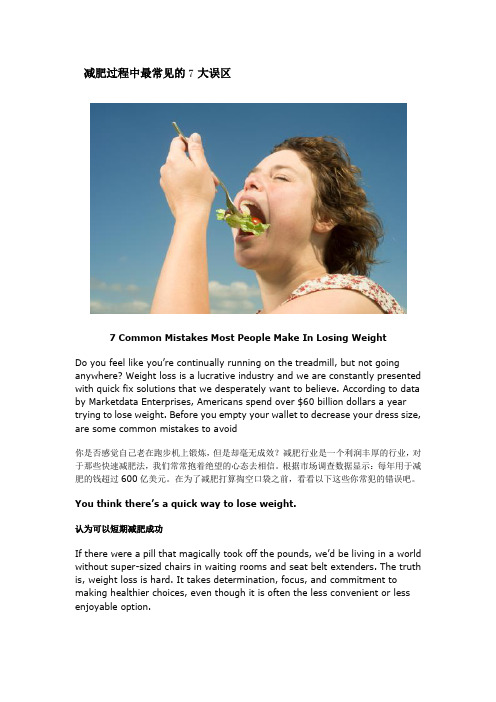
减肥过程中最常见的7大误区7 Common Mistakes Most People Make In Losing WeightDo you feel like you’re continually running on the treadmill, but not going anywhere? Weight loss is a lucrative industry and we are constantly presented with quick fix solutions that we desperately want to believe. According to data by Marketdata Enterprises, Americans spend over $60 billion dollars a year trying to lose weight. Before you empty your wallet to decrease your dress size, are some common mistakes to avoid你是否感觉自己老在跑步机上锻炼,但是却毫无成效?减肥行业是一个利润丰厚的行业,对于那些快速减肥法,我们常常抱着绝望的心态去相信。
根据市场调查数据显示:每年用于减肥的钱超过600亿美元。
在为了减肥打算掏空口袋之前,看看以下这些你常犯的错误吧。
You think there’s a quick way to lose weight.认为可以短期减肥成功If there were a pill that magically took off the pounds, we’d be living in a w orld without super-sized chairs in waiting rooms and seat belt extenders. The truth is, weight loss is hard. It takes determination, focus, and commitment to making healthier choices, even though it is often the less convenient or less enjoyable option.要是减肥药能让你一下子就减肥成功,那么等候区就不会有超大号的椅子,安全带也不会有多余的部分。
2024学年第一学期《大学英语3》期末考试
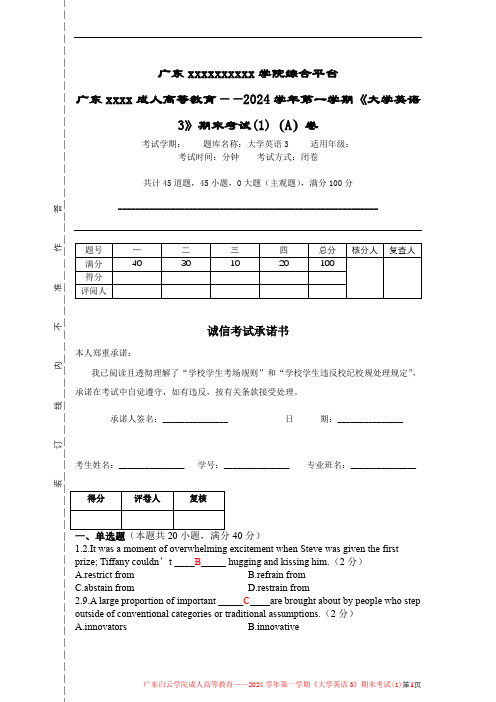
│││││││││││││││││││││││││││││││││││││││││││││装 订 线 内 不 准 作 答 广东xxxxxxxxxx 学院综合平台 广东xxxx 成人高等教育——2024学年第一学期《大学英语3》期末考试(1)(A )卷 考试学期: 题库名称:大学英语3 适用年级: 考试时间:分钟 考试方式:闭卷 共计45道题,45小题,0大题(主观题),满分100分 ----------------------------------------------------------- 诚信考试承诺书 本人郑重承诺: 我已阅读且透彻理解了“学校学生考场规则”和“学校学生违反校纪校规处理规定”,承诺在考试中自觉遵守,如有违反,按有关条款接受处理。
承诺人签名:_______________ 日 期:_______________ 考生姓名:_______________ 学号:_______________ 专业班名:_______________ 40分) 1.2.It was a moment of overwhelming excitement when Steve was given the first prize; Tiffany couldn ’t ____B _____ hugging and kissing him.(2分) A.restrict from B.refrain from C.abstain from D.restrain from 2.9.A large proportion of important _____C ____are brought about by people who step outside of conventional categories or traditional assumptions.(2分) A.innovators B.innovative│││││││││││││││││││││││││││││││││││││││││││││││││装 订 线 内 不 准 作 答 C.innovations D.renovation 3.Formal consent for this new type of treatment was obtained from each patient and the study ____B _____our institution's guidelines concerning medical ethics (伦理).(2分) A. contended for B. conformed to C. coincided with D. conferred with 4.All the tulips in Zoe ’s garden are white. All the roses in Zoe ’s garden are yellow. Therefore, all the flowers in Zoe ’s garden are either white or yellow.(2分) A.True B.False C.Uncertain 5.3.Cell phone conversations, which are fairly _________on commuter trains, can be annoying to fellow commuters.(2分) A.interesting B.ordinary monplace D.average 6.7.You may be out of work but that is no reason to ________ by not washing ,brushing your hair and wearing clean clothes.(2分) A.let yourself go B.force yourself to do C.deviate yourself from D.throw yourself at 7.8.Formal consent for this new type of treatment was obtained from each patient and the study _________ our institution's guidelines concerning medical ethics (伦理).(2分) A.contended for B.conformed to C.coincided with D.conferred with 8.It was felt that he lacked the _____ to pursue a difficult task to the very end.(2分) A.petition B.engagement mitment D.qualification 9.In the 1970s, a number of countries passed laws to protect women ’s rights, announcing that they would_________ women through education and work.(2分) A.screw B.levy C.save D.emancipate 10.This restaurant is very popular because it has some separate, smaller rooms ________ families with small children.(2分) A.reserving for B.reserved for C.reserve for D.reserves for 11.People ________ canned food and old clothes most frequently, but rarely do they think about bringing in underwear - it's one of the most obvious but overlooked needs of the homeless.(2分) A.donator B.donate C.donation D.donating 12.It was ________ that the professor's lecture failed to impress the students as some of them had left before it was over.(2分) A.apparat B.apparent C.appalling D.appealing 13.Because the transcript is still under seal, the law ________ them _______ reading│││││││││││││││││││││││││││││││││││││││││││││装 订 线 内 不 准 作 答 and discussing the evidence in detail.(2分) A.changes .....from B.precludes .....from C.turns ...... into D.nominates ...... as 14.Once a contract is signed, revisions of any part of the product design will_______ an added fee for the client.(2分) A.incur B.occur C.deduce D.induce 15.I think the ________ to give children too many toys and clothes is quite common in American families.(2分) A.tendency B.currency C.fluency D.efficiency 16.1.The guerrillas shot down one aeroplane and ________ the pilot.(2分) A.capturing B.captured C.was captured D.to be captured 17.5.During one particularly ________ moment in my career, a senior colleague of mine said to me. “If you follow your dreams, the money will come. Follow the money, and you ’ll lose your dreams ”.(2分) A.blank B.branch C.bright D.bleak 18.4. Girls like to ________ themselves in modern dresses. (2分) A.make B.put on C.dress D.wear 19.Since the beginning of this century, China has built many modern conference centers with underground parking, air -conditioning and _________translation systems.(2分) A. instantaneous B. extemporaneous C. simultaneous D. miscellaneous 20.If the United States had built more homes for poor people in 1995, the housing problems now in some parts of the country _____ so serious.(2分) A.wouldn't be B.wouldn't have been C.will not be D.would have not been 30分) 21.以下句子有误的是(ABC )。
小学上册第五次英语第三单元全练全测
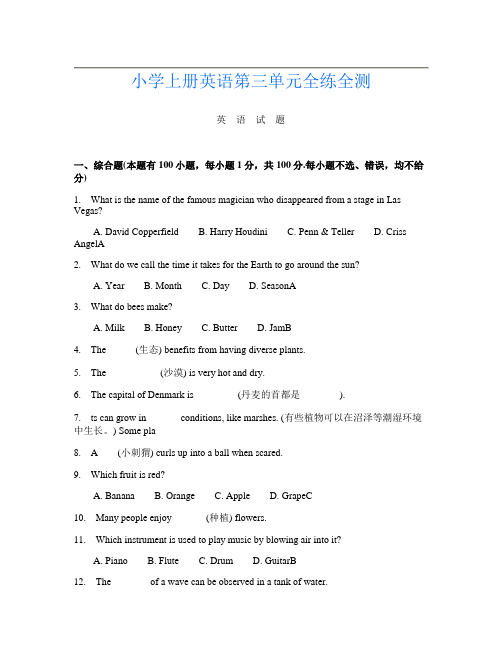
小学上册英语第三单元全练全测英语试题一、综合题(本题有100小题,每小题1分,共100分.每小题不选、错误,均不给分)1.What is the name of the famous magician who disappeared from a stage in Las Vegas?A. David CopperfieldB. Harry HoudiniC. Penn & TellerD. Criss AngelA2.What do we call the time it takes for the Earth to go around the sun?A. YearB. MonthC. DayD. SeasonA3.What do bees make?A. MilkB. HoneyC. ButterD. JamB4.The _____ (生态) benefits from having diverse plants.5.The __________ (沙漠) is very hot and dry.6.The capital of Denmark is ________ (丹麦的首都是________).7.ts can grow in ______ conditions, like marshes. (有些植物可以在沼泽等潮湿环境中生长。
) Some pla8. A ___ (小刺猬) curls up into a ball when scared.9.Which fruit is red?A. BananaB. OrangeC. AppleD. GrapeC10.Many people enjoy ______ (种植) flowers.11.Which instrument is used to play music by blowing air into it?A. PianoB. FluteC. DrumD. GuitarB12.The _______ of a wave can be observed in a tank of water.13.The tree is _______ (covered) in snow.14.The __________ (罗马神话) included gods like Mars and Venus.15.What is the primary function of the heart?A. To breatheB. To pump bloodC. To digest foodD. To filter wasteB16.I can ______ (完成) tasks efficiently.17.What do you call a person who studies fossils?A. PaleontologistB. GeologistC. ArchaeologistD. All of the aboveA18.There are many ________ (树木) in the forest.19.My cousin is very __________ (开朗).20.What is the term for the distance light travels in one year?A. Light-YearB. Astronomical UnitC. ParsecsD. Cosmic Yard21.Which celestial body orbits the Earth?A. SunB. MoonC. MarsD. Venus答案:B22.Certain plants can ______ (提供) habitat for endangered species.23.During special occasions like __________, my family and I celebrate by__________. We decorate the house with __________ and prepare delicious food. This brings us all together, and we share stories about __________.24.What is the name of the famous ballet dancer?A. Anna PavlovaB. Misty CopelandC. Margot FonteynD. All of the above25.We have a _____ (聚会) planned for summer.26.The ____ has bright blue wings and is found near water.27.What do we call a young pangolin?A. PupB. KitC. CalfD. ChickA Pup28.What do we call the act of working together toward a common goal?A. CollaborationB. TeamworkC. CooperationD. All of the AboveD29.Which fruit is red and often used to make jam?A. BananaB. CherryC. MangoD. KiwiB30.The ________ (生态监测) helps track changes.31.The color of a star indicates its _______.32. A kitten can be very ______ (调皮).33.What do we call a person who repairs plumbing?A. ElectricianB. PlumberC. MechanicD. Carpenter34.Which ocean is located between Africa and Australia?A. AtlanticB. IndianC. ArcticD. PacificB35.My uncle is a fantastic ____ (storyteller).36. A solution where no more solute can dissolve is called ______.37.The __________ (历史的意义) can evolve over time.38.What do you call the person who sings?A. DancerB. PainterC. SingerD. Writer39.I enjoy playing ________ (团队运动) with friends.40.The ________ Revolution began in the late 18th century.41.The _____ (相互关系) between plants and animals is vital.42.The atomic mass of an element is the average mass of its ______.43.Acids taste _____ and can be sour.44.The __________ (历史的传承责任) ensure continuity.45. A ______ is a symbol of freedom.46.The ______ (小鸟) sings beautifully in the morning.47. A __________ is a natural feature that allows water to flow through the land.48.I can spell my ___. (name)49.I love camping in the mountains. My favorite part is __________.50.The weather is _______ (晴天) today.51.What do you call a story that is made up?A. BiographyB. FictionC. Non-FictionD. HistoryB52.I enjoy singing ________ (歌曲) with my friends.53.What is the term for a word that has the opposite meaning?A. SynonymB. AntonymC. HomonymD. Phoneme54.The boiling point of a liquid is affected by _____.55.Certain plants can ______ (促进) health and well-being.56.How many rings does Saturn have?A. 1B. 2C. 3D. More than 3057.________ (植物适应性) is fascinating to study.58.The pufferfish can _________ itself. (膨胀)59.She has a ________ for her birthday.60.What is the capital of Brunei?A. Bandar Seri BegawanB. Kuala BelaitC. TutongD. SeriaA61.The __________ (历史的影响) is multi-faceted.62.What do you call a story that is told in verse?A. NovellaB. PoemC. ProseD. NarrativeB63.The ancient Romans built large ______ (建筑) for public gatherings.64.My aunt gives me __________. (礼物)65.We should __________ our hands before eating.66.The opossum plays dead to avoid ______ (捕食者).67.The __________ (珍稀动物) need protection from extinction.68.The main gas in the Earth's atmosphere is ______.69.I watched a _______ (小黄鹂) build its nest in the tree.70.The capital of Samoa is __________.71.What is 20 5?A. 10B. 15C. 20D. 25B72.The stars are ___ (twinkling/shining).73.The chemical symbol for bismuth is ______.74.What do you call a baby cheetah?A. CubB. KitC. PupD. FawnA75. A solution that can conduct electricity is called an ______ solution.76.What is 99 - 1?A. 97B. 98C. 99D. 10077.What is the capital of Chile?A. SantiagoB. QuitoC. Buenos AiresD. LimaA78.What do you call the flat surface on which a game is played?A. BoardB. FieldC. CourtD. Table79.The __________ (地理位置) affects climate and weather.80.The __________ (树皮) protects the tree from damage.81. A chemical change often involves the release of ______.82.I have a collection of stuffed ________ (玩具名称).83.What is the name of the famous American author known for "The Old Man and the Sea"?A. Ernest HemingwayB. F. Scott FitzgeraldC. John SteinbeckD. Mark TwainA84.The sky is ______ (blue) and clear.85.He has a pet ___. (rabbit)86.The weather is _______ (非常凉爽).87.What is the past tense of "eat"?A. EatenB. AteC. EatingD. EatsB88.The _____ (水培) method allows plants to grow without soil.89.My dog enjoys rolling in the _______ (草).90.The _____ (柚子) tree has big fruits.91.The kitten chases after a _______ (小猫追逐一只_______).92.Which insect makes honey?A. AntB. ButterflyC. BeeD. FlyC93.I can ________ my name.94.My ________ (朋友) is planning a birthday party this weekend.95.What is the capital of Brunei?A. Bandar Seri BegawanB. Kuala BelaitC. SeriaD. TutongA96.I have a collection of toy _____.97.Insects help in the ______ (传粉) process.98.My cousin is very __________ (有条理的) in her studies.99.An exothermic reaction releases ______.100.The first computer was developed in the ______ (20世纪中叶).。
你是属于哪种茶类英语作文
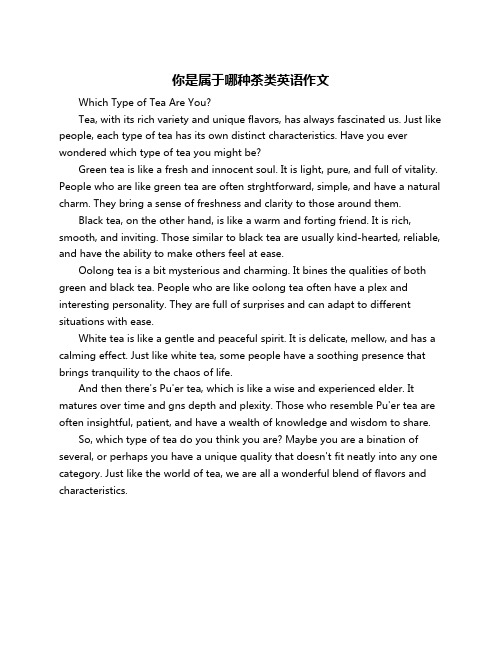
你是属于哪种茶类英语作文Which Type of Tea Are You?Tea, with its rich variety and unique flavors, has always fascinated us. Just like people, each type of tea has its own distinct characteristics. Have you ever wondered which type of tea you might be?Green tea is like a fresh and innocent soul. It is light, pure, and full of vitality. People who are like green tea are often strghtforward, simple, and have a natural charm. They bring a sense of freshness and clarity to those around them.Black tea, on the other hand, is like a warm and forting friend. It is rich, smooth, and inviting. Those similar to black tea are usually kind-hearted, reliable, and have the ability to make others feel at ease.Oolong tea is a bit mysterious and charming. It bines the qualities of both green and black tea. People who are like oolong tea often have a plex and interesting personality. They are full of surprises and can adapt to different situations with ease.White tea is like a gentle and peaceful spirit. It is delicate, mellow, and has a calming effect. Just like white tea, some people have a soothing presence that brings tranquility to the chaos of life.And then there's Pu'er tea, which is like a wise and experienced elder. It matures over time and gns depth and plexity. Those who resemble Pu'er tea are often insightful, patient, and have a wealth of knowledge and wisdom to share.So, which type of tea do you think you are? Maybe you are a bination of several, or perhaps you have a unique quality that doesn't fit neatly into any one category. Just like the world of tea, we are all a wonderful blend of flavors and characteristics.。
买东西选择困难症英语作文
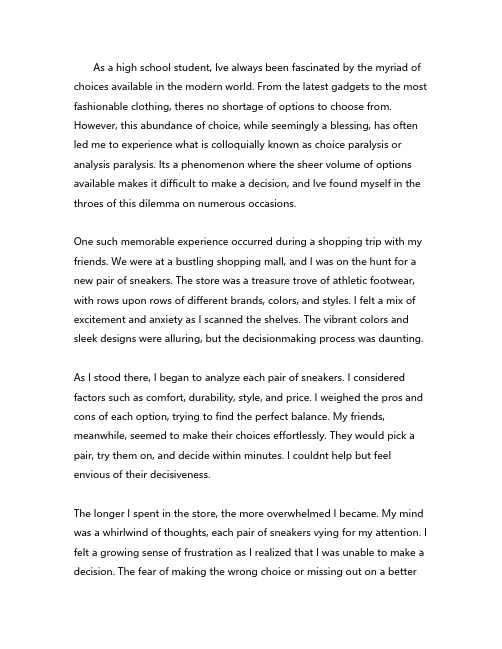
As a high school student, Ive always been fascinated by the myriad of choices available in the modern world. From the latest gadgets to the most fashionable clothing, theres no shortage of options to choose from. However, this abundance of choice, while seemingly a blessing, has often led me to experience what is colloquially known as choice paralysis or analysis paralysis. Its a phenomenon where the sheer volume of options available makes it difficult to make a decision, and Ive found myself in the throes of this dilemma on numerous occasions.One such memorable experience occurred during a shopping trip with my friends. We were at a bustling shopping mall, and I was on the hunt for a new pair of sneakers. The store was a treasure trove of athletic footwear, with rows upon rows of different brands, colors, and styles. I felt a mix of excitement and anxiety as I scanned the shelves. The vibrant colors and sleek designs were alluring, but the decisionmaking process was daunting.As I stood there, I began to analyze each pair of sneakers. I considered factors such as comfort, durability, style, and price. I weighed the pros and cons of each option, trying to find the perfect balance. My friends, meanwhile, seemed to make their choices effortlessly. They would pick a pair, try them on, and decide within minutes. I couldnt help but feel envious of their decisiveness.The longer I spent in the store, the more overwhelmed I became. My mind was a whirlwind of thoughts, each pair of sneakers vying for my attention. I felt a growing sense of frustration as I realized that I was unable to make a decision. The fear of making the wrong choice or missing out on a betteroption was paralyzing.This experience is not unique to me. In fact, its a common issue faced by many consumers today. The concept of analysis paralysis has been studied by psychologists and marketers alike. Its been found that when presented with too many choices, people tend to experience decision fatigue, which can lead to dissatisfaction and regret, even if they eventually make a decision.To overcome this challenge, Ive learned to employ a few strategies. First, I try to narrow down my options by setting clear criteria for what Im looking for. This helps to eliminate choices that dont meet my specific needs or preferences. Second, Ive learned to trust my instincts. Sometimes, the first pair of sneakers that catches my eye is the one that feels right. Lastly, I remind myself that its okay to make a mistake. No decision is perfect, and its important to accept that there will always be tradeoffs.Moreover, Ive come to appreciate the value of simplicity in decisionmaking. In a world where we are constantly bombarded with choices, its refreshing to embrace the idea of minimalism. Whether its choosing between two favorite flavors of ice cream or deciding on a single outfit for the day, simplifying our options can lead to greater satisfaction and less stress.In conclusion, the experience of choice paralysis is a testament to the complexity of modern consumer culture. While its exciting to have a plethora of options at our fingertips, its also important to recognize the potential pitfalls of too much choice. By setting clear criteria, trusting ourinstincts, and embracing simplicity, we can navigate the decisionmaking process with greater ease and confidence. After all, the goal is not to have the most options, but to make the best choice for ourselves.。
剑桥雅思18 作文 test4
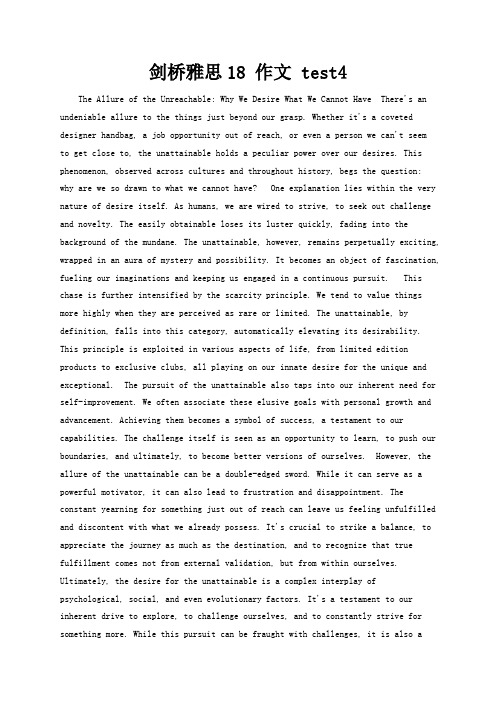
剑桥雅思18 作文 test4The Allure of the Unreachable: Why We Desire What We Cannot Have There's an undeniable allure to the things just beyond our grasp. Whether it's a coveted designer handbag, a job opportunity out of reach, or even a person we can't seemto get close to, the unattainable holds a peculiar power over our desires. This phenomenon, observed across cultures and throughout history, begs the question: why are we so drawn to what we cannot have? One explanation lies within the very nature of desire itself. As humans, we are wired to strive, to seek out challenge and novelty. The easily obtainable loses its luster quickly, fading into the background of the mundane. The unattainable, however, remains perpetually exciting, wrapped in an aura of mystery and possibility. It becomes an object of fascination, fueling our imaginations and keeping us engaged in a continuous pursuit. This chase is further intensified by the scarcity principle. We tend to value things more highly when they are perceived as rare or limited. The unattainable, by definition, falls into this category, automatically elevating its desirability. This principle is exploited in various aspects of life, from limited edition products to exclusive clubs, all playing on our innate desire for the unique and exceptional. The pursuit of the unattainable also taps into our inherent need for self-improvement. We often associate these elusive goals with personal growth and advancement. Achieving them becomes a symbol of success, a testament to our capabilities. The challenge itself is seen as an opportunity to learn, to push our boundaries, and ultimately, to become better versions of ourselves. However, the allure of the unattainable can be a double-edged sword. While it can serve as a powerful motivator, it can also lead to frustration and disappointment. The constant yearning for something just out of reach can leave us feeling unfulfilled and discontent with what we already possess. It's crucial to strike a balance, to appreciate the journey as much as the destination, and to recognize that true fulfillment comes not from external validation, but from within ourselves. Ultimately, the desire for the unattainable is a complex interplay of psychological, social, and even evolutionary factors. It's a testament to our inherent drive to explore, to challenge ourselves, and to constantly strive for something more. While this pursuit can be fraught with challenges, it is also afundamental part of the human experience, shaping our desires, motivating our actions, and ultimately, defining who we are.。
脑洞里的奇葩作文英语
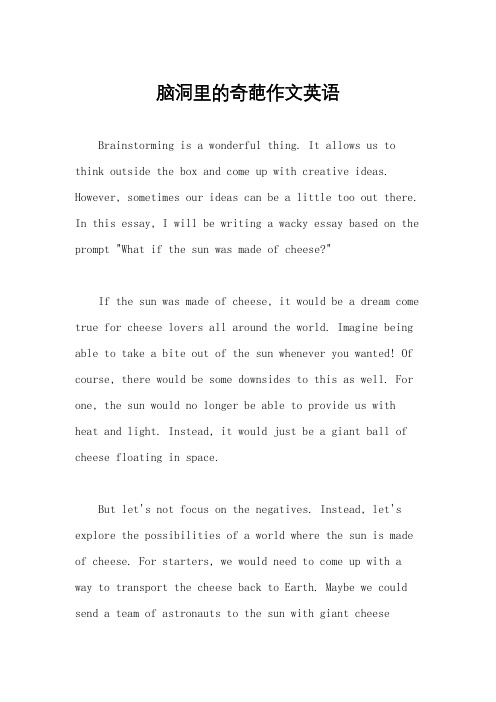
脑洞里的奇葩作文英语Brainstorming is a wonderful thing. It allows us to think outside the box and come up with creative ideas. However, sometimes our ideas can be a little too out there. In this essay, I will be writing a wacky essay based on the prompt "What if the sun was made of cheese?"If the sun was made of cheese, it would be a dream come true for cheese lovers all around the world. Imagine being able to take a bite out of the sun whenever you wanted! Of course, there would be some downsides to this as well. For one, the sun would no longer be able to provide us with heat and light. Instead, it would just be a giant ball of cheese floating in space.But let's not focus on the negatives. Instead, let's explore the possibilities of a world where the sun is made of cheese. For starters, we would need to come up with a way to transport the cheese back to Earth. Maybe we could send a team of astronauts to the sun with giant cheeseknives and have them slice off chunks of cheese to bring back with them. Or, we could build a giant cheese-grater spaceship that could shred the sun into small pieces and transport them back to Earth.Once we had the cheese safely back on Earth, the possibilities would be endless. We could create all sorts of new cheese-based products, like sun-cheese pizza or sun-cheese sandwiches. We could even start a new cheese-based economy, where people trade different types of sun-cheese like they would gold or silver.Of course, there would also be some challenges to overcome. For example, how would we prevent the cheese from going bad? Would we need to refrigerate it, or would it stay fresh on its own? And what about the smell? Would the entire planet smell like cheese all the time?Despite these challenges, I believe that a world where the sun is made of cheese would be a wonderful place to live. We would be able to indulge in our love of cheeselike never before, and we would have a new source of foodand energy to sustain us. So let's embrace our wacky ideas and imagine a world where the impossible becomes possible. Who knows? Maybe one day we'll actually get to taste the sun for ourselves.。
销售东西英文作文
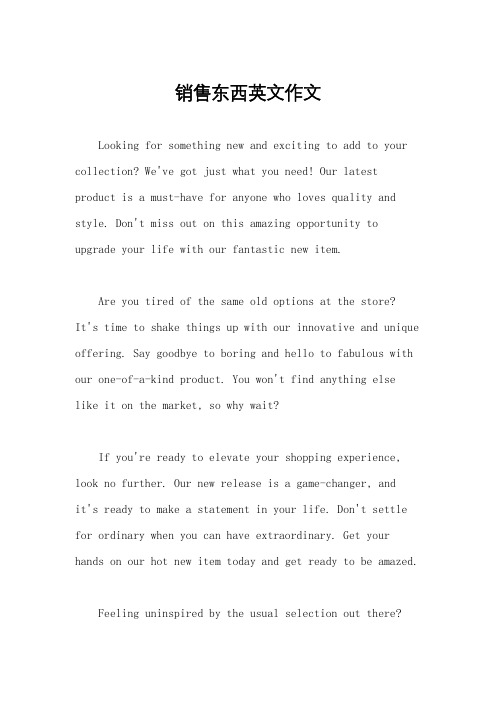
销售东西英文作文Looking for something new and exciting to add to your collection? We've got just what you need! Our latest product is a must-have for anyone who loves quality and style. Don't miss out on this amazing opportunity to upgrade your life with our fantastic new item.Are you tired of the same old options at the store?It's time to shake things up with our innovative and unique offering. Say goodbye to boring and hello to fabulous with our one-of-a-kind product. You won't find anything elselike it on the market, so why wait?If you're ready to elevate your shopping experience, look no further. Our new release is a game-changer, andit's ready to make a statement in your life. Don't settle for ordinary when you can have extraordinary. Get your hands on our hot new item today and get ready to be amazed.Feeling uninspired by the usual selection out there?Our fresh and exciting product is here to save the day. With its unbeatable quality and unbeatable style, it's ano-brainer. Treat yourself to something special and add our amazing new item to your cart now. You won't regret it!。
英语卷子高中试题及答案
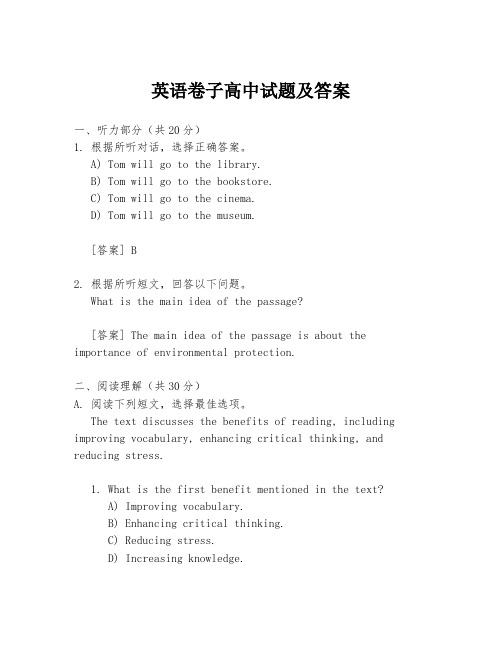
英语卷子高中试题及答案一、听力部分(共20分)1. 根据所听对话,选择正确答案。
A) Tom will go to the library.B) Tom will go to the bookstore.C) Tom will go to the cinema.D) Tom will go to the museum.[答案] B2. 根据所听短文,回答以下问题。
What is the main idea of the passage?[答案] The main idea of the passage is about the importance of environmental protection.二、阅读理解(共30分)A. 阅读下列短文,选择最佳选项。
The text discusses the benefits of reading, including improving vocabulary, enhancing critical thinking, and reducing stress.1. What is the first benefit mentioned in the text?A) Improving vocabulary.B) Enhancing critical thinking.C) Reducing stress.D) Increasing knowledge.2. According to the text, which of the following is NOT a benefit of reading?A) Developing empathy.B) Expanding imagination.C) Gaining practical skills.D) Reducing stress.[答案] CB. 阅读下面的文章,回答以下问题。
The article talks about the impact of technology on education.1. What does the author believe about the role of technology in education?A) It is essential.B) It is optional.C) It is harmful.D) It is controversial.[答案] A2. What is an example of how technology has changed education mentioned in the article?A) Online courses.B) Traditional textbooks.C) Classroom lectures.D) Handwritten assignments.三、完形填空(共20分)Read the following passage and fill in the blanks with the appropriate words or phrases.In recent years, the popularity of online shopping has grown rapidly. People can buy almost everything online, from clothes to electronics. However, there are some drawbacks to this convenience. For example, you can't try on clothes before buying them, which can lead to disappointment.1. The word "popularity" in the passage is closest in meaning to:A) CommonnessB) PopularityC) UnpopularityD) Rarity[答案] B2. What is the main problem mentioned in the passage regarding online shopping?A) The high cost.B) The lack of physical interaction.C) The inability to return items.D) The inability to try on clothes.[答案] D四、语法填空(共10分)Fill in the blanks with the correct form of the word given in the brackets.The scientist (1) (discover) a new species of plant in the Amazon rainforest. This discovery (2) (be) a significant contribution to the field of botany. The plant (3) (grow) in a very specific environment and (4) (not) be found elsewhere.1. [discover][答案] discovered2. [be][答案] has been3. [grow][答案] grows4. [not][答案] cannot五、书面表达(共20分)Write a short essay of about 120 words on the topic "The Influence of Social Media on Our Daily Life."The essay should include the following points:1. The prevalence of social media in our lives.2. The positive and negative impacts of social media.3. Your personal opinion on the role of social media.[范文]Social media has become an integral part of our daily life.It allows us to connect with friends and family, share our experiences, and access information instantly. On the positive side, it has made communication easier and fostered a sense of community. However, it also has its downsides, such as the spread of misinformation and the potential for addiction. Personally, I believe that social media should be used responsibly. It can be a powerful tool for good when used with caution and moderation.。
烘焙食品加工技术38
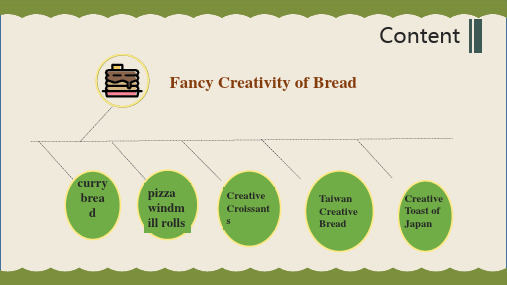
Thank
for watching!
Only by constantly providing consumers with diversified and innovative products can we lead the trend orientation of baking industry, survive in this industry, not be eliminated, and create new products that others can't, attracting customers' taste buds and favor.
Students, if you are ready for courage and courage, meet the challenge of the baker. If you are not ready, it is a good choice to take baking as a hobby.
3. Press out the lines of beard and nails with tools, and then put them into the oven.
4. After baking, paint the five senses and you're done.
Baker is an industry that d, but we should also learn to use our brains, so that we can eat more.
On the basis of mastering the basic raw material properties of bread, the taste and shape of bread should always be updated, because even the best products have a life cycle.
李开复英语名言
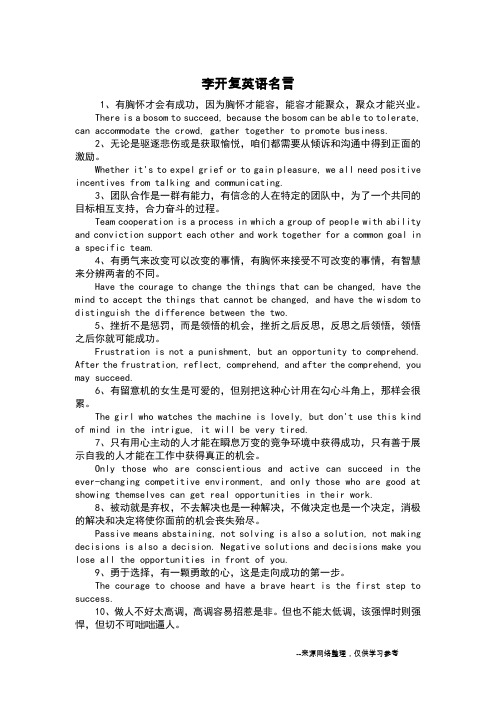
李开复英语名言1、有胸怀才会有成功,因为胸怀才能容,能容才能聚众,聚众才能兴业。
There is a bosom to succeed, because the bosom can be able to tolerate, can accommodate the crowd, gather together to promote business.2、无论是驱逐悲伤或是获取愉悦,咱们都需要从倾诉和沟通中得到正面的激励。
Whether it's to expel grief or to gain pleasure, we all need positive incentives from talking and communicating.3、团队合作是一群有能力,有信念的人在特定的团队中,为了一个共同的目标相互支持,合力奋斗的过程。
Team cooperation is a process in which a group of people with ability and conviction support each other and work together for a common goal ina specific team.4、有勇气来改变可以改变的事情,有胸怀来接受不可改变的事情,有智慧来分辨两者的不同。
Have the courage to change the things that can be changed, have the mind to accept the things that cannot be changed, and have the wisdom to distinguish the difference between the two.5、挫折不是惩罚,而是领悟的机会,挫折之后反思,反思之后领悟,领悟之后你就可能成功。
Frustration is not a punishment, but an opportunity to comprehend. After the frustration, reflect, comprehend, and after the comprehend, you may succeed.6、有留意机的女生是可爱的,但别把这种心计用在勾心斗角上,那样会很累。
Pride and Prejudice

Pride and Prejudice"It is a truth universally acknowledged, that a single man in possession of a good fortune must be in want of a wife". This is a sentence from Jane Austen's distinguished novel Pride and Prejudice,which moved me deeply. From the sentence, we can clearly realize the significance of fortune to the marriage at that time. In order to show it to us, the author described the different marriages of Mr. Bennet's five daughters.Actually, Pride and Prejudice mainly focused on Elizabeth's love story with Mr. Darcy. And the author tried to compare Elizabeth's ideal marriage with others so that readers could know about the social reality. As far as I am concerned, the book portrayed not only romantic but also realistic love between males and females. According to people's different ways to deal with their marriage, the book showed us young women's various attitudes toward marriage. As the author considered, it is wrong to marry someone for his fortune、money or position. However, not thinking about the above factors is stupid as well. In a word, Jane Austen objected to marrying for love or treating marriage as a joke. Sheemphasized the importance of ideal marriage and believed that true love is the basis of it.The title of this book has two meanings. "Pride"is used to describe Mr. Darcy, who is a handsome and rich gentleman from the upper-classes in England. "Prejudice" refers to an ordinary lady whose name is Elizabeth. When these two people first met at the ball, Darcy's improper behaviour annoyed Elizabeth. As he had an inborn superiority that he looked down at every person from the lower-classes. Due to her strongself-respect, Elizabeth decided not to pay attention to Mr. Darcy. But soon later, Darcy was attracted by her lovely action and proposed to her regardless of their different status. Elizabeth refused him for his pride. As she thought such pride was the reflection of their different identities and with this it's impossible to own a happy marriage. But gradually, Elizabeth saw Darcy's great changes in some aspect and dispelled misunderstanding and prejudice. At last,Darcy and Elizabeth,the two different even opposite youngsters fell in love .That’s very incredible.From my personal perspective, Elizabeth is anintelligent and obstinate girl. Such characteristics make her have her own principles toward life. Love between Mr. Darcy and Elizabeth is able to enlighten us much. In fact,we are always proud and think something in our mind but not right. We assess others only depend on their background or their color of skin. We hide our true heart .But why don’t we ask ourselves in our heart or mind: what do we feel in fact? What do we need in fact? What do we hate and love in fact? Why not express our real feelings at once? We must learn to stick to our beliefs on the way of pursing love. Do not make any decisions randomly on the basis of status or wealth. Do not change our own ideas easily. Happiness needs to be created by ourselves.。
MBA词汇

考研(英语二)英语核心词汇本核心词汇属核心词汇之精要版本,适合基础较薄弱且复习时间较少的同学快速突破核心词汇时及备考之初时使用。
abandon离弃,放弃abandon one’s career/ ambitionabide?遵循(…by);容忍?The one thing she cannot abide is lying. abnormal?反常的?abnormal behaviorabolish?彻底废除(法律、制度、习俗等)abolish old customabsolute?纯粹的,完全的?have absolute trust in sb.absorb?吸收,吸进?A sponge absorbs water.abstract?抽象的?A flower is beautiful, but beauty itself is abstract.absurd?荒谬的,荒唐的?The idea that number 14 brings bad luck is absurd. abuse?滥用?abuse one's authority(office)?aaccelerate?加速,增速?accelerate one’s stepsaccess?接近(或进入)的机会?have regular and immediate access to the Presidentaccommodate?使适应,使符合一致?accommodate oneself to changed circumstancesaccompany?陪伴,伴随?She was accompanied to a dinner by her friend. accomplish?达到(目的),完成(任务),实现(计划,诺言等)?accomplish one's purposeaccord?使符合,相一致(with)?His violent action do not accord with his peaceful words.account?? 记述,叙述?give a brief account of what has happened accumulate?积累,积攒,积聚?accumulate wisdomaccurate?准确的,精确的?an accurate estimateaccuse?指控,指责?They accused her publicly of stealing their books. accustom?使习惯于?accustom oneself to rising (to rise) earlyacquaint?使认识,使了解activate?使活动起来,使开始起作用,启动?They have planted secret agents in many countries who could be activated whenever needed.acute?尖锐的,敏锐的?an acute thinker?adapt?(使)适应?adapt oneself to new conditionsaddress?演说?a television address?adhere?黏附,附着?Paste is used to make one surface adhere to another. adjacent?临近的,毗邻的(to)?a city and its adjacent suburbsadjoin?贴近,与...毗邻?His house adjoins the lake.administrate?掌管,料理...的事务?In many Japanese homes, the funds are administrated by the wife.adolescent?(尤指16岁以下的)青少年?a film aimed at adolescents advance ?使向前移动?advance a chessmanadvantage?有利条件,优点?Sitting Presidents hold built-in advantages when seeking another term.adverse?不友好的,敌对的?She felt adverse to her husband's friends. advocate?拥护,提倡,主张?advocate self-defenceaesthetic?美学的,艺术的,审美?an aesthetic theoryaffiliate?使隶属(或附属)于,使成为会员?a government affiliated company affirm?断言,申明?affirm the truth of a statementaggravate?加重,加剧,恶化?aggravate the declining economy aggressive?侵犯的,侵略的?an aggressive weaponalarm?惊恐,忧虑?The bandits scattered in alarm.alert?警惕的,留神的?In our reading we should always be alert for new usages.alien?外国的?adjust to an alien cultureallege?断言,宣称?The newspaper alleges the mayor's guilt.allocate?分配,分派,把...拨给?allocate funds for new projectsallied?结盟的,有关联的?allied nationsallow?允给,准许,允许?He missed her more than he would allow himself to admit.allowance?津贴,补贴,零用钱?a housing allowancealter?改变,更改?alter an attitude?alternate?交替,轮流?Night and day alternate.amateur ?(艺术,科学等的)业余爱好者?an amateur golferamaze?使惊愕,使惊异?I am amazed that he should get the post. ambiguous?含糊不清的,模棱两可的?an ambiguous answerambition?(对名利等的)强烈欲望,野心?His political ambitions still burn. amend?修改,修订?amend the spelling in sb.'s paperamuse?逗乐,逗笑,给...提供娱乐(或消遣)?The clown at the circus amused the children.anchor?锚?The anchor catches (drags).announce?宣布,声称?It is officially announced that he will not run for reelection.annoy?使恼怒,使生气?She was annoyed at (with) his lightheard attitude. annual?每年的,年度的?the annual output of steelanswer?回答,响应?Henry took ages to answer the door.anticipate?预期,预料?The directors anticipated a fall in demand (that demand would fall).anxious?焦虑的,发愁的(about, at)?They become anxious at her delay. apart?成零碎?Such cheap clothes come apart after a few washings. apparent?显然的,明明白白的?It was apparent that they all understood. appeal?呼吁,恳求?I appealed to the children to make less noise. applaud?鼓掌,喝彩,叫好?The audience applauds the performers for three minutes.apply?涂,敷?He applied two coats of paint to the table.appoint?任命,委派?They appointed his father (to be 或as) postmaster. appraise?估量,估计?appraise the infant's weightappreciate?感激?I appreciated your help much.apprehend?对...担心?Do you apprehend that there will be any difficulty? approach?靠近,接近?John is approaching manhood.appropriate?恰当的,相称的?Plain, simple clothes are appropriate for school wear.approve?赞成,同意?I couldn't approve his conduct.approximate?大概的,大约的,近似的?The approximate time is 10 o'clock. apt?(习性)易于......的,有......倾向的?A careless person is apt to make mistakes.arise?起立,起身?arise from one's seatarouse?使......奋发?A man like Tom will be aroused.?Don’t worry.array?排列,队形?The troops were formed in battle array.articulate?发音清晰的,善于表达的?He is articulate about everything in the field of economics.artificial?人工的,人造的,人为的?artificial price controlsascend?登高,(渐渐)上升,升高?The airplane ascended into the cloud. ascertain 查明,弄清,确定?I ascertained that he was dead.ashamed?惭愧的,羞耻的?I am ashamed for being so stupid.ashore?向岸,向陆地?He swam ashore.aside?在旁边?We stood aside to let her pass.assault?攻击,袭击?We made an assault on the enemy fort.assemble?集合,召集?assemble the members of Parliament for a special meeting.assert?肯定地说(出),坚定地断言?He asserted his innocence.assess?估价,评价,评论?assess the present state of the economy assign?分配,布置(作业)?The teacher assigned (us) a new lesson. associate?(使)联系,(使)结合?We naturally associated the name of Darwin with the doctrine of evolution.assume?假定,假设?Farmers will have a bumper harvest, assuming (that) theweather is favorable.assure 深信不疑地对......说,向......保证assurance?保证,把握,信心?He gave me his assurance that he would help. astonish?使惊讶?I was astonished at his sudden appearance.attach?系,贴,连接?attach a label to a suitcaseattain?达到,获得?attain one’s goalattend?出席,参加(会议等)?attend a weddingattendance?出席,参加,出席人数,出席率Our class has perfect attendance today.attentive?注意的,专心的?an attentive audienceattribute?把归因于,把......(过错的责任等)归于(to)?He attributed his success to hard work.auxiliary?辅助的?an auxiliary rocketavail?有利于,有助于?Will force alone avail us?average?平均数,平均?The paper receives an average of nearly 100 articles a day.avert?挡开,防止,避免?Many traffic accidents can be averted by courtesy. awake?醒,觉醒?awake from sleepaward?授予(奖品等)?The university awarded him an honorary degree. ban?(以官方明令)禁止,取缔?He was banned from entering the city. bang?(突发的)?sudden loud bangbar?条,块,杆,棒?a bar of goldbare?赤裸的,光秃的,空无内容的?walk in bare feetbeforehand?预先,事先?If you wanted soup for lunch you should have told me beforehand.behave?举止端正,听话Do behave.bewilder?使迷惑,使糊涂?I’m bewildered as to which one to buy.bias?偏见,偏心?have a bias against sb.(或sth.)blame?责备,责怪?Public opinion blames Mrs Smith for leading the girl astray. blast?一阵(风),一股(气流)?a blast of windblaze?火焰?The fire sprang into a blaze.blunt?钝的?The sun was blazing down and the heat was oppressive. blush?(因害羞、激动、窘困)脸红?blush with(或for) joyboast?? 自吹自擂,自夸的话?He is full of boasts.bolt?螺栓,(门,窗的)插销?a small bag of nuts and boltsboom?低沉有回响的声音?The great bell tolled with a deep boom.border?边界,边境,边沿?a district on the Kampuchean side of the border with Thailandbore?钻孔,挖(通道)?bore through a wallbounce?弹起,反弹?The ball doesn’t bounce well.bound?跳跃,弹回?She bounded to her feet and waved her right hand triumphantly.boycott?(联合起来)抑制,拒绝参加?boycott uncooperative manufactures brace?托架,支架?He braced his muscles and lifted the weight.breed?(使)繁殖?Rabbits breed families rapidly.bribe?贿赂?accept(或take)a bribe from sb.brief?短暂的,简短的,简洁的?a brief holidaybrisk?轻快的,生气勃勃的?a brisk pacebrittle?易碎的,一碰就破的?brittle glassbrush?刷子,毛刷?a laundry brushbump?碰,撞(against, into)?The truck bumped against the wall in the dark. burst?爆炸,爆裂?The boiler burst.calculate?计算,推算?calculate the distance between New York and Chicago call?喊,叫?Please call the names of all the people who are present. cancel?取消,废除,删去?cancel a tripcapture?俘虏,捕获?capture butterfliescase?事例,事实,事情?This is a case of poor judgment.cast?投,扔,抛,撒,掷?cast doubt(s) on the feasibility of a scheme casual?偶然的,无计划的,随便的,非正式的?a casual meetingcease?停止,终止,结束?The music ceased suddenly.certify?证明,证实?The accounts were certified (as) correct.challenge?向...挑战?Our school challenged the local champion team to a football match.character?(事物的)性质,特质?The furniture in Tom’s apartment was pretentious and without character.charge?要(价),收(费)?The airlines charge half price for students. charm?魅力,魔力?This thriving resort town has retained its village charm. chase?追逐,追求?The police chased the escaping thief and caught him at last.check?使突然停止,制止?check one’s stepscherish?珍爱,珍视?cherish one’s native landchew?嚼,咀嚼?He chewed a mouthful of meat.choke?窒息,噎住?be choked by smokechorus?合唱队chronic?(疾病)慢性的,(人)久病的?chronic indigestionclarity?澄清,阐明?clarify an issuecling?粘着?The frightened child clung to her mother.clumsy?笨拙的?a clumsy boycluster?(果实,花等的)串,束,簇; (人或物)的群,组?a cluster of tourists clutch?紧抓,紧握?clutch at an opportunitycoherent?一致的,协调的?lack coherent political goalscoin?硬币,钱币,金属货币?a silver coincoincide?相符,相一致?100 Centigrade coincides with 212 Fahrenheit. collaborate?(尤指在文艺、科学等方面)合作,协作?He and I collaborated in writing plays.collapse?倒坍,崩溃,瓦解?The roof collapsed under the weight of the snow. collide?碰撞,互撞?The car collided with the truck.come?来,来到?Will you come to the dance tonight?commemorate?纪念,庆祝?commemorate a holidaycommend?表扬,称赞?commend a soldier for braverycompact?紧密的,坚实的?a compact piece of luggagecompare?比较,对照(with, to)?? compare the body to a finely tuned machinecompatible?能和睦相处的,合的来的?You should choose a roommate more compatible to your tastes.compile?汇编,编制?compile an anthology of poemscomply?遵从,顺从,服从?comply with rules(safety regulations) compose?组成,构成?England, Scotland, and Wales compose the island of Great Britain.compress?压缩?He compresses a lifetime as a soldier into a few sentences comprise?包含,包括?The shipyard comprises three docks.compromise?妥协,折衷?compromise over the hard-fought next. compulsory?必须做的,义务的?a compulsory subjectconceal?隐藏,隐瞒,隐蔽?He concealed his disappointment from his friends. conceive?构想出,设想?conceive an ideaconcentrate?集中,专心?concentrate one’s attentioncondemn?谴责?We all condemn cruelty to children.condense?(使)压缩,(使)凝结,使简洁?condense a speech to half confer?商谈,商议?confer with sb. Over (on, about, concerning) sth. confess?坦白,供认,承认,忏悔?confess one’s crimeconfidence?信任?break sb.’s confidenceconfine?限制,使局限?They succeeded in confining the fire to a small area. confirm?证实,肯定?confirm a rumourconflict?(尤指长期的)战争,战斗?The conflict between Greece and Troy lasted ten years.conform?遵照,适应?confirm to(或with) the rules(the law)confront?(使)面临,(使)遭遇?The war confronted him with hardships. confuse?使混乱,混淆?He confused the arrangements by arriving late. connect?连接,连接?The bridge connects the island with(或to) the mainland. conscious?意识到的,自觉地?They were conscious that he disapproved. consent?同意,赞同,准许?The people will never consent to another war. conserve?保护,保藏,保存?conserve natural resourcesconsider?考虑,细想?Consider carefully before doing anything.consist?组成,构成(of)?The house consists of six rooms.consolidate?巩固,加强?consolidate one’s positionconspicuous?显眼的,明显的,引人瞩目的?He felt as conspicuous as if he had stood on a stage.constant?经常的,不断的?a constant noiseconstitute?组成,构成?constitute a threat to sb.consult?请教,与......商量?consult a doctor about one’s illnessconsume 消费,花费: consume much of one’s time in readingcontact?接触,联系,交往: be in contact with sb.contain 包括,容纳, a list containing twelve itemscontaminate弄脏,污染,玷污,毒害: Fumes contaminate the aircontempt轻视,轻蔑:show a contempt for sb.contest竞赛,比赛,竞争:the contest between the two powers for the control of the regioncontract合同,契约:enter into(make)a contact withcontradict反驳,同….相矛盾,同….相抵触:The facts contradict his theorycontrary相反的,对抗的:take the contrary viewcontrast对照,对比,(对比之下显出的)差异:the contrast between the two forms of governmentcontribute捐(款等),捐献:He contributed 5dollars to the charity every payday contrive设计,想出:contrive a new methodcontroversy(尤之以文字形式进行的争论),辨证:a point of controversy convention(正式)会议,(定期)大会:draft a new constitution at a convention convert转变,转化:convert coal to (into) pipeline gasconvey运送,输送,传送:a wire conveys an electric currentconvict(经审讯)证明…有罪,宣判…有罪:He was convicted of smuggling coordinate调节,协调:coordinate the functions of government agencies cordial热情友好的,热诚的,真心的:a cordial hello(smile, invitation) correspond相符合相称(to,with):Fulfillment seldom corresponds to anticipation correspondent通信者,通讯员,记者:a good(bad)correspondent corresponding符合的,一致的:corresponding fingerprintscorrode(渐渐)损害,(一点一点地)损伤:Bribery corrodes the confidence that must exist between buyer and sellercorrupt堕落的,腐败的,贪赃舞弊的:lead a corrupt lifecount数,计算: count the moneycourse课程,科目:an English coursecourtesy 谦恭有礼。
得到是另一种失去作文好词好句
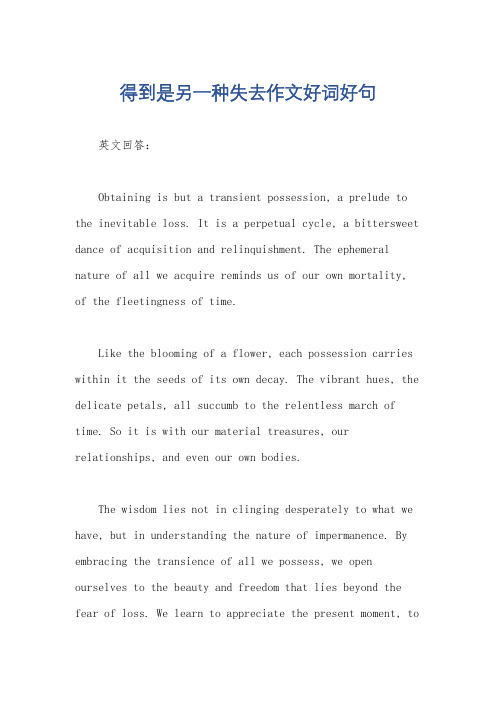
得到是另一种失去作文好词好句英文回答:Obtaining is but a transient possession, a prelude to the inevitable loss. It is a perpetual cycle, a bittersweet dance of acquisition and relinquishment. The ephemeral nature of all we acquire reminds us of our own mortality, of the fleetingness of time.Like the blooming of a flower, each possession carries within it the seeds of its own decay. The vibrant hues, the delicate petals, all succumb to the relentless march of time. So it is with our material treasures, our relationships, and even our own bodies.The wisdom lies not in clinging desperately to what we have, but in understanding the nature of impermanence. By embracing the transience of all we possess, we open ourselves to the beauty and freedom that lies beyond the fear of loss. We learn to appreciate the present moment, tosavor the sweetness of each experience, knowing that itwill soon pass.In the Buddhist tradition, the concept of "anicca" teaches us that all is impermanent, that all is subject to change. It is not a pessimistic view, but rather arealistic one, a recognition of the fundamental nature of existence. By understanding anicca, we can cultivate a sense of detachment, a freedom from the attachments that bind us to suffering.The Roman poet Horace famously wrote, "Carpe diem," seize the day. It is a reminder to live in the present, to make the most of each moment, for time waits for no one. By embracing the transience of all we have, we can live more fully, more authentically, and with a greater sense of purpose.中文回答:获取乃另一种失去。
尼采名言 英文
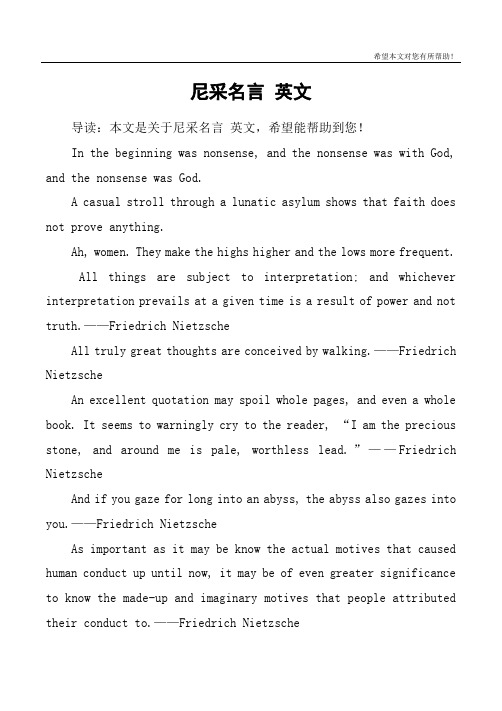
尼采名言英文导读:本文是关于尼采名言英文,希望能帮助到您!In the beginning was nonsense, and the nonsense was with God, and the nonsense was God.A casual stroll through a lunatic asylum shows that faith does not prove anything.Ah, women. They make the highs higher and the lows more frequent.All things are subject to interpretation; and whichever interpretation prevails at a given time is a result of power and not truth.——Friedrich NietzscheAll truly great thoughts are conceived by walking.——Friedrich NietzscheAn excellent quotation may spoil whole pages, and even a whole book. It seems to warningly cry to the reader, “I am the precious stone, and around me is pale, worthless lead.”——Friedrich NietzscheAnd if you gaze for long into an abyss, the abyss also gazes into you.——Friedrich NietzscheAs important as it may be know the actual motives that caused human conduct up until now, it may be of even greater significance to know the made-up and imaginary motives that people attributed their conduct to.——Friedrich NietzscheAt times one remains faithful to a cause only because its opponents do not cease to be insipid.——Friedrich Nietzsche Battle not with monsters, lest ye become a monster, and if you gaze into the abyss, the abyss gazes also into you.——Friedrich NietzscheBe careful when you fight the monsters, lest you become one.——Friedrich NietzscheBehind all their personal vanity, women themselves always have an impersonal contempt for woman.——Friedrich Nietzsche Belief in truth begins with doubt of all truths in which one used to believe.——Friedrich NietzscheIs man one of God’s blunders? Or is God one of man’s blunders?Many are stubborn in pursuit of the path they have chosen, few in pursuit of the goal.。
- 1、下载文档前请自行甄别文档内容的完整性,平台不提供额外的编辑、内容补充、找答案等附加服务。
- 2、"仅部分预览"的文档,不可在线预览部分如存在完整性等问题,可反馈申请退款(可完整预览的文档不适用该条件!)。
- 3、如文档侵犯您的权益,请联系客服反馈,我们会尽快为您处理(人工客服工作时间:9:00-18:30)。
problem. We also present a recursively based variety of finite type, which is defined by laws involving only constants (i.e., no variables), with solvable but not uniformly solvable word problem. This second result is the best possible one can provide for varieties defined by laws involving no variables: every finitely based such variety has uniformly solvable word problem. If one were satisfied with varieties with infinitely many operations, then it would be relatively easy to produce an example of a recursively based variety with solvable but not uniformly solvable word problem; we present such an example, essentially due to B. Wells [11], at the end of the paper. Our proof uses the iinsolvability of the halting problem for the universal Turing machine, and the laws defining the variety precisely allow us to model the action of the universal Turing machine in the variety. In the usual proofs that the variety of semigroups has an undecidable word problem, a finitely presented congruence is given such that for any initial Turing machine configuration, the instantaneous descriptions of the Turing machine calculations all lie in the same congruence class. Then laws are added which make the halting state a right and left zero. So, the undecidability of the word problem in this algebra comes from not being able to decide whether a given word (initial configuration) is congruent to the halting state. This algebra contains all possible Turing machine calculations. In our variety each calculation will be modelled by a single algebra. Our approach is based on a different picture of a Turing machine calculation than the sequence of instantaneous descriptions used in semigroups. We view a Turing machine calculation as taking place on a Z x co grid, where the copy of Z with second coordinate n represents the Turing machine tape at time n. To understand the calculation, we must know the alphabet content of each square, which square the head is reading for each time n, and the state the machine is in at time n. There are various possible ways to formalize this insight, so that each Turing machine calculation corresponds to a finitely presented algebra. To ensure that the word problem does not have a uniform solution, we introduce a function which has value 1 when applied to any state the machine reaches and value 0 on the halting state. Then a decision procedure which, given a finite presentation, determines whether 1 is congruent to 0 would solve the halting problem. There are considerable technical difficulties in implementing this idea in such a way that we can prove that each finitely presented algebra in the variety has a decidable word problem. It seems to us that there are two interesting directions that research can follow in the light of the results in this paper. There remains the question of whether a finitely based variety of unary algebras with solvable word problem has uniformly solvable word problem. Another direction research could take is to consider subvarieties of interesting natural varieties. This could either be understood as varieties of X where A' is a favourite class of algebras or, say, congruence modular varieties. This second problem was suggested to us by the persistent question of everyone to whom we told the result, namely 'Is there a natural example?' The research for this paper was begun while the latter two authors were visitors at the Department of Mathematics and Statistics at Simon Fraser University. We gratefully acknowledge financial support from the Natural Science and Engineering Research Council of Canada. This is paper #291 on Shelah's publication list. We also wish to thank the referee for a thorough job of reading the paper.
Dedicated, by her co-authors, to the memory of Evelyn Nelson who died after the
paper was bmitted Dedicated by Saharon Shelah to his friend Alan Mekler
ABSTRACT
In the literature two notions of the word problem for a variety occur. A variety has a decidable word problem if every finitely presented algebra in the variety has a decidable word problem. It has a uniformly decidable word problem if there is an algorithm which given a finite presentation produces an algorithm for solving the word problem of the algebra so presented. A variety is given with finitely many axioms having a decidable, but not uniformly decidable, word problem. Other related examples are given as well.
